Donna Leon
Books: Mystery
Commissario Guido Brunetti: Death at La Fenice (1992), Death in a Strange Country (1993), Dressed for Death (usa) / The Anonymous Venetian (uk) (1994), Death and Judgment (usa) / A Venetian Reckoning (uk) (1995), Acqua Alta (1996), Quietly in Their Sleep (usa) / The Death of Faith (uk) (1997), A Noble Radiance (1998), Fatal Remedies (1999), Friends in High Places (2000), A Sea of Troubles (2001), Willful Behavior (2002), Uniform Justice (2003), Doctored Evidence (2004), Blood from a Stone (2005), Through a Glass, Darkly (2006), Suffer the Little Children (2007), The Girl of His Dreams (2008), About Face (2009), A Question of Belief (2010), Drawing Conclusions (2011), Beastly Things (2012), The Golden Egg (2013), By its Cover (2014), Falling in Love (2015), The Waters of Eternal Youth (2016), Earthly Remains (2017), The Temptation of Forgiveness (2018), Unto Us a Son Is Given (2019), Trace Elements (2020), Transient Desires (2021), Give Unto Others (2022), So Shall You Reap (2023)
Commissario Guido Brunetti
Death at La Fenice (1992)
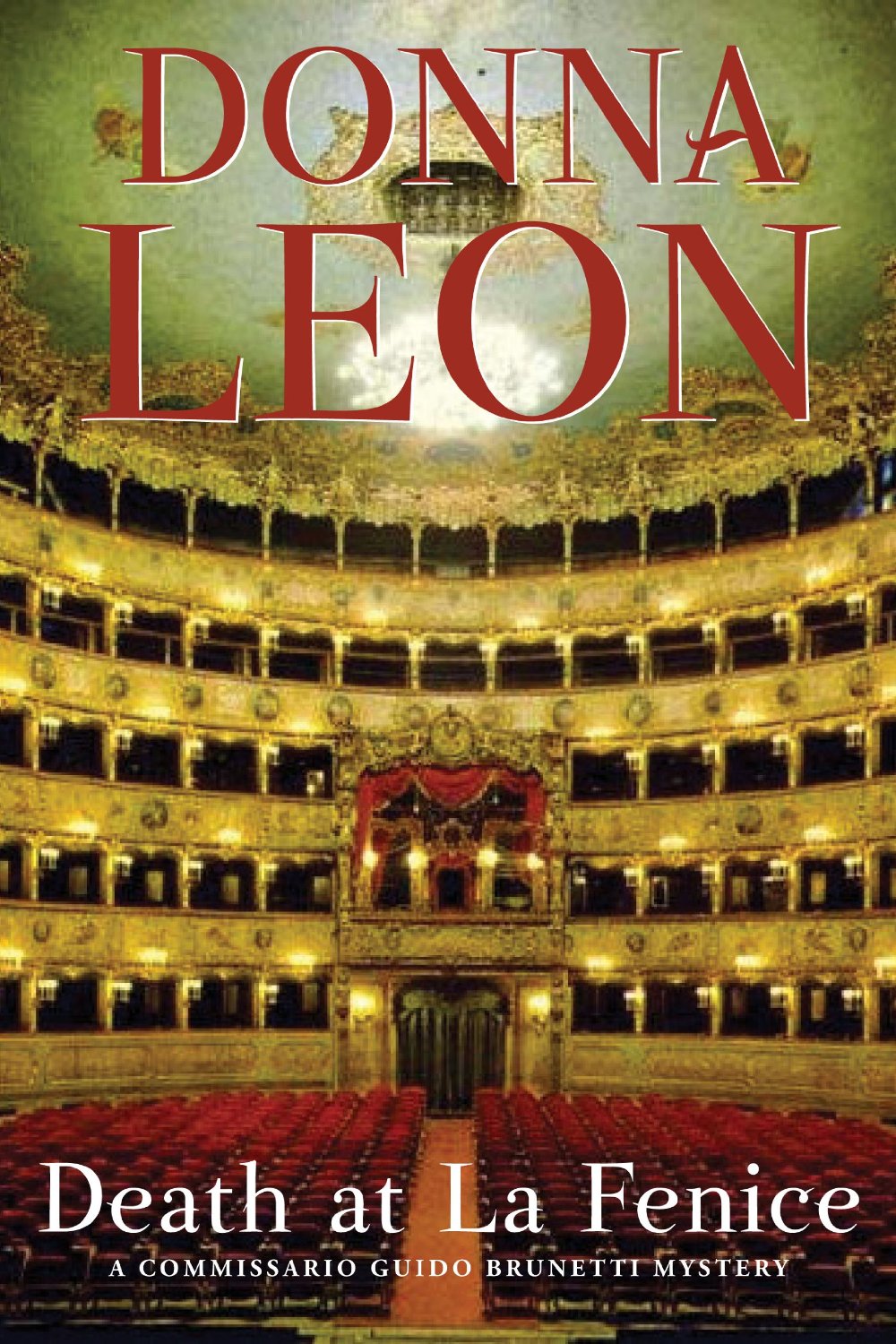 Guido Brunetti is vice-commissario of police in the Venice, and a good detective as well. When a world famous maestro is found dead in his dressing room, from what seems to be cyanide poisoning, Guido is immediately pressured to find the killer, lest Venice receive bad press.
Guido Brunetti is vice-commissario of police in the Venice, and a good detective as well. When a world famous maestro is found dead in his dressing room, from what seems to be cyanide poisoning, Guido is immediately pressured to find the killer, lest Venice receive bad press.
I love Donna Leon's Guido Brunetti series. It's set in Venice, Italy, and the place is a much a character as Brunetti, his family, and the other members of the Questura.
Like all street addresses in Venice, the one the American had given him was virtually meaningless in a city with only six different names for street addresses and a numbering system without plan or reason. The only way to find it was to get to the church and ask someone who lived in the neighbourhood.
More importantly, this book introduces us to Commisario Brunetti.
That may well be one of the only descriptions we get of him–I can't think of another description of him, but I might just have glossed over it.He was a surprisingly neat man: tie carefully knotted, hair shorter than was the fashion; even his ears lay close to his head, as if reluctant to call attention to themselves. His clothing marked him as Italian. The cadence of his speech announced that he was Venetian. His eyes were all policeman.
Although I guessed the killer about halfway through, it didn't take away any of my enjoyment from the story, because I'd still not figured out they why.
Guido is a very good detective who is also compassionate–something that you don't always find in fictional police detectives. I enjoyed watching Guido's impressions of different individuals change as he spent more time interviewing them. The other thing I liked was his relationship with his family and his wife's family. Relationships that initially seemed cliched quickly turned into something more complex, as we see Guido's opinion of those around him changing–and learn of their impressions of him.
Donna Leon does a very good job of building not just the mystery, but also the characters and the story. No one is quite as expected, and the story wandered in place I didn't expect, but seemed reasonable after we went there.
About the only thing that struck me as strange was the attitude towards homosexuals held by certain characters in the story. I am not sure if this was due to the fact that the book was set more than 15 years ago, or because the attitudes in Italy are different from those in the US (I'd actually be very interested in learning which it was–but not curious enough that I'm going to do work and look it up.) And let me make it clear it was not the main characters that held these attitudes, but those attitudes did not seem to be seen as unusual, which was unusual for me.
I also loved the details about Venice, and how the city plays such a prominent part in the story. It's another city I've love to visit, but I fear that by the time I ever get around to all the travel I'd like to do, the feel of so many cities will be gone.
If you like mysteries set in cities not your own, then I highly recommend Death at La Fenice. Good detective, good city, good story.
Published by Grove Press
- February 2008 | Rating: 8/10
- July 2013 | Rating: 8/10
- October 2015 | Rating: 8/10
- October 2020 | Rating: 8.5/10
Death in a Strange Country (1993) #2
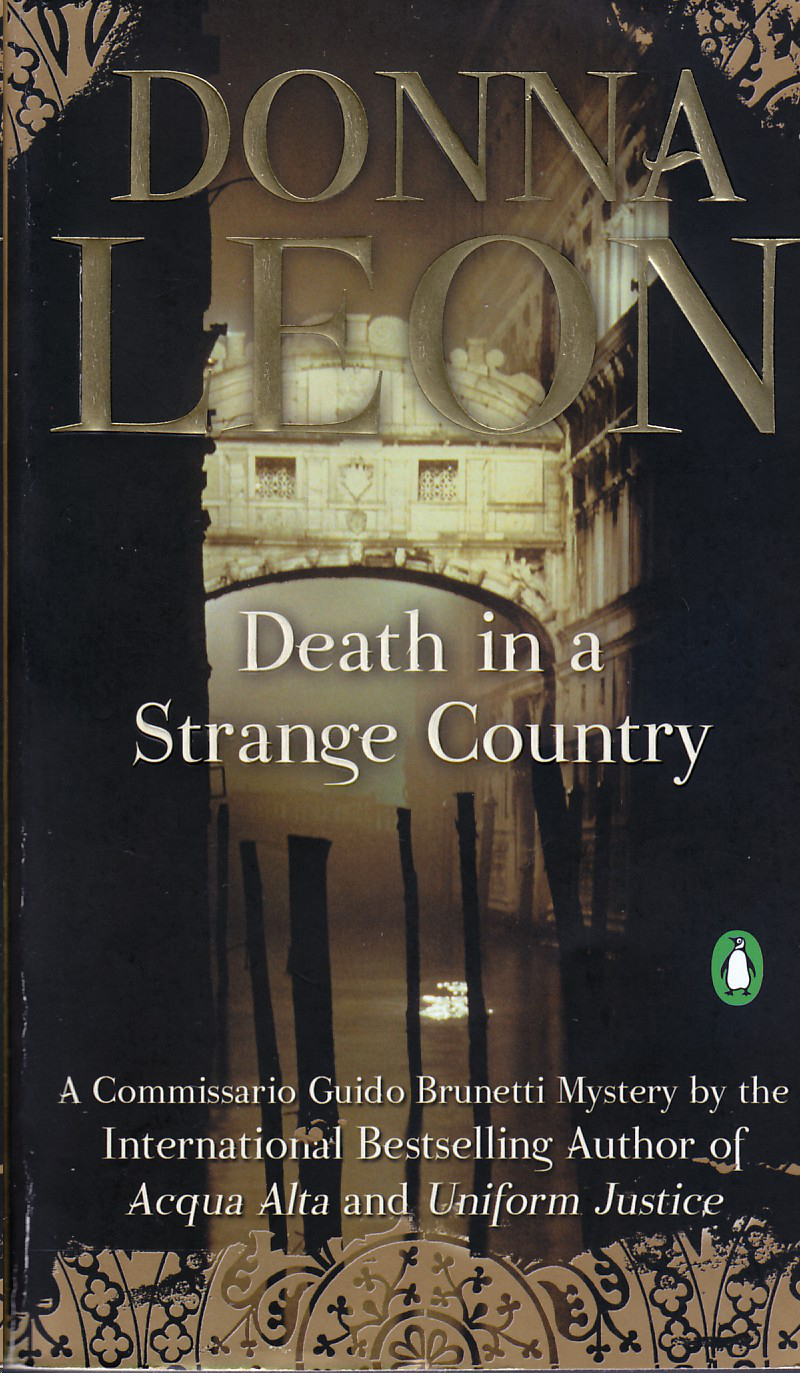 The second Commissario Guido Brunetti mystery (how I managed to read the third book instead of the second in two different series within a week is beyond me) finds Guido awakened to come down to a canal as a body was found in the water. The stab wound that is discovered rules out an accident, and as it becomes quickly apparent that the man was not an Italian but was instead an American, things become even more confusing–and dangerous.
The second Commissario Guido Brunetti mystery (how I managed to read the third book instead of the second in two different series within a week is beyond me) finds Guido awakened to come down to a canal as a body was found in the water. The stab wound that is discovered rules out an accident, and as it becomes quickly apparent that the man was not an Italian but was instead an American, things become even more confusing–and dangerous.
A body if found in the canal and all signs point to it being an American.
Odd, the things that set people apart.'Ah, that could be it,' the doctor said. 'An American.'
'What?'
'Why he's in such good shape,' Rizzaldi answered… 'That might explain it. They're always so fit, so healthy.' Together, they looked at the body, at the narrow waist that showed under the still open shirt.
'If he is,' Rizzaldi said, 'the teeth will tell me.'
'Why?'
'Because of the dental work. They used different techniques, better materials. If he's had any dental work done, I'll be able to tell you this afternoon if he's American.
The more time I spend reading about Commissario Guido Brunetti, the more I like him. He's a straight man in a very crooked world–a man who sees the big things as they should be, rather than as they are. He doesn't try to right every wrong–he knows the futility in that–but tries to right the big wrongs, the murders and deaths it is his job to solve.
But what I like most is that we see Guido not just at work, but at home, talking to and thinking about his wife. Worrying about his children. Thinking about food and money and the things that we all consider every day. But most importantly, we see him enjoying the world around him. He stops to enjoy the beauty of Venice, of the everyday world around him.
It is the complexities that make him such an interesting character. The complexities of the murders and crime around him are a bonus.
And the mysteries are good. Like the characters, they are complex, and there are not always eat solutions or answers. (As much as I love mysteries and the resolution of story arcs, sometimes the resolution is that the problem is not and cannot be solved, and that there can be no neat and tidy ending. It is this not knowing how things are going to turn out that I like so much about these mysteries.
You should easily be able to read this book without having read the first. Although each story builds Guido's character, you should be able to appreciate the mystery and enjoy it for its strengths even without having read the previous book. But it seems to me that the more we learn about Guido through this series, the better the series will get.
Published by Penguin Books
- May 2008 | Rating: 8/10
- August 2013 | Rating: 8/10
- October 2015 | Rating: 8/10
Dressed for Death (1994) #3
 The third Commiario Guido Brunetti mystery, Dressed for Death starts with the body of what is assumed to be a prostitute found behind a slaughterhouse in Marghera. The case falls to the Mestre police department, however due to a series of unfortunate events, they have no detectives, so Brunetti is sent to investigate, despite the fact that he was supposed to leave for vacation.
The third Commiario Guido Brunetti mystery, Dressed for Death starts with the body of what is assumed to be a prostitute found behind a slaughterhouse in Marghera. The case falls to the Mestre police department, however due to a series of unfortunate events, they have no detectives, so Brunetti is sent to investigate, despite the fact that he was supposed to leave for vacation.
Something else, even more important, happens in this story.
Leaving Patta's office, Brunetti noticed that, while he was inside, furniture had suddenly appeared in the small anteroom that stood directly outside Patta's office. A large wooden desk stood on one side, and a small table had been placed below the window.
That's right!
'And you are?' he asked with a smile.
'Elettra Zorzi, sir. I started work last week as secretary to Vice-Questore Patta.'
'I'm very pleased to meet you, Signorina Zorzi,' Brunetti said.
'I believe I'm to work for you, as well, Commissario,' she said smiling.
As with Death at La Fenice, there was so much I liked about this story. I like Brunetti and how he deals with people. I find Venice fascinating–so much corruption, taken at face value. And I really enjoy the mysteries. Then putting all three of those things together, we got a thoroughly enjoyable story.
What I think I like best about Brunetti is that even his home life is fascinating. His wife and kids are real and complex people (even if we don't see much of his kids in this story) and his own background is as complex as the mysteries in which he becomes entangled.
I have no idea if the Venice presented here reflects Venice as it actually is (or was as this book was written in 1994) but real or no it's a fascinating place. Not a world I think I would be comfortable moving in myself, but a fascinating place to visit.
The other thing I particularly like is the complexity of the mystery, and law enforcement. In such a complex city, solving a murder is complex was well, especially when politics and money are involved.
If you have not read the first Commissario Brunetti you should easily be able to read this without having read Death at La Fenice. Although we learn more about Brunetti's character here, this story is not dependent upon the previous. But as the first mystery was good, you'll probably want to find and enjoy that one as well.
Published by Penguin Books
- May 2008 | Rating: 7/10
- August 2013 | Rating: 8/10
- October 2015 | Rating: 8/10
Death and Judgment (1995) #4
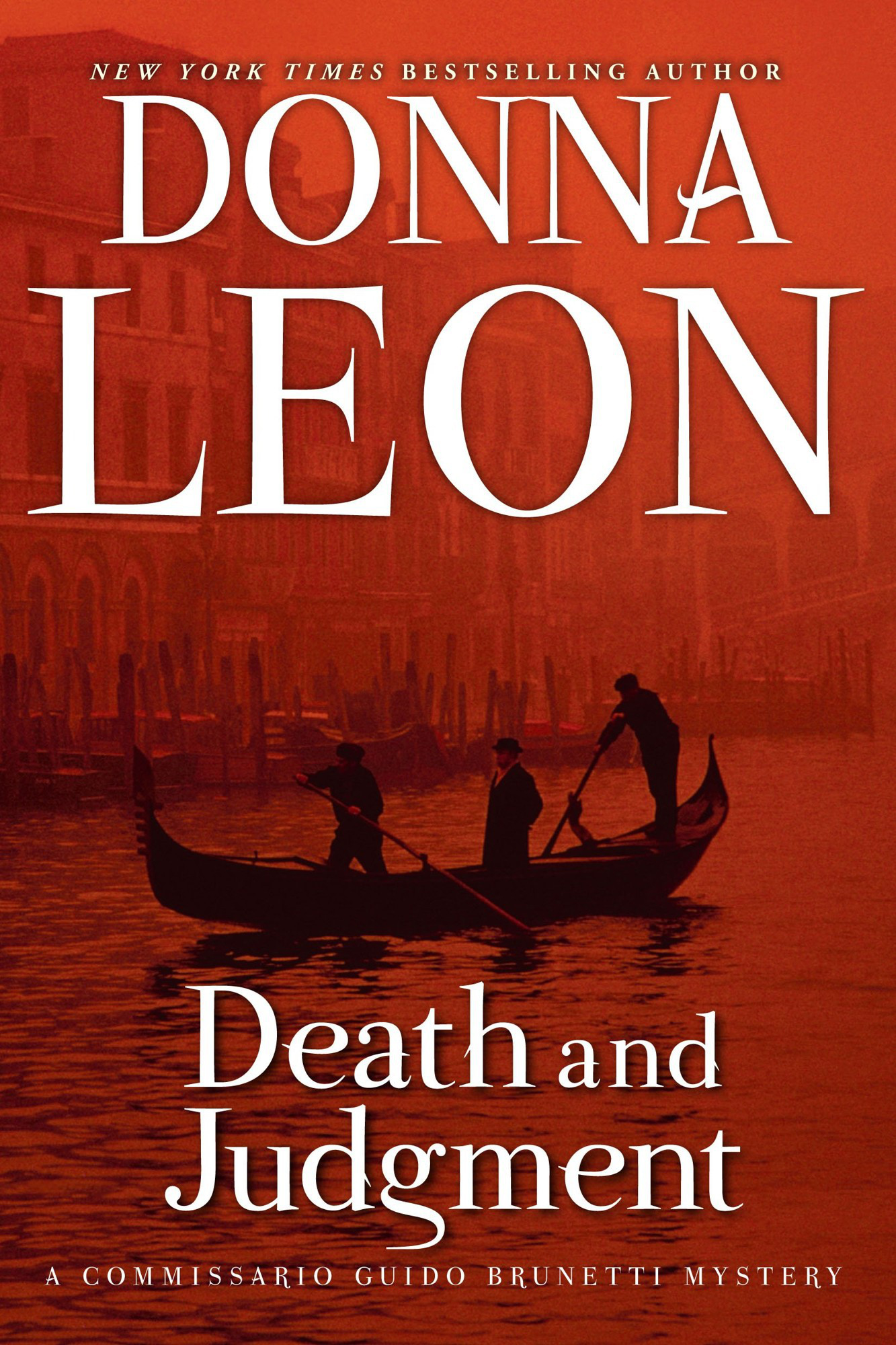 In two seemingly unrelated incidents, a truck goes off a cliff, killing the driver and his unexpected cargo of lumber and women. And months later, in Venice, Commissario Guido Brunetti is given the investigation of the murder of a prominent local loyal, whose unblemished record is enough cause for suspicion in thoroughly corrupt Venice.
In two seemingly unrelated incidents, a truck goes off a cliff, killing the driver and his unexpected cargo of lumber and women. And months later, in Venice, Commissario Guido Brunetti is given the investigation of the murder of a prominent local loyal, whose unblemished record is enough cause for suspicion in thoroughly corrupt Venice.
As with the previous mysteries, we follow not just Guido's investigation of the murder, but to his home where he discusses (against all regulations) his cases with his beloved wife. And this time, his daughter Chiara, however tangentially.
There are so many things that make these mysteries so good. First and foremost is Guido's (and thus the author's) open-eyed love of Venice. Despite the faults and corruption that run through the core, Guido still loves the city, and considers it in loving detail, especially when he must go elsewhere in pursuit of a case.
As with the previous stories, we continue to see the corruption in the city, and how that corruption has infiltrated every corner of the city, and of Italy. We see that the laws and rules are so arcane and confusing that it is impossible for anyone not to break laws during the course of a regular week. It also leads to and interesting discussion upon legality versus morality, and where Guido's job falls in this spectrum.
As with the previous book, you should easily be able to pick up Death and Judgment without having read the previous books in the series, but as with most series, the books build upon each other, so it's always more fulfilling to read a series, watching the characters develop over the course of the series.
Published by Grove Press
- May 2008 | Rating: 8/10
August 2013 | Rating: 7/10
October 2015 | Rating: 8/10
Acqua Alta (1996) #5
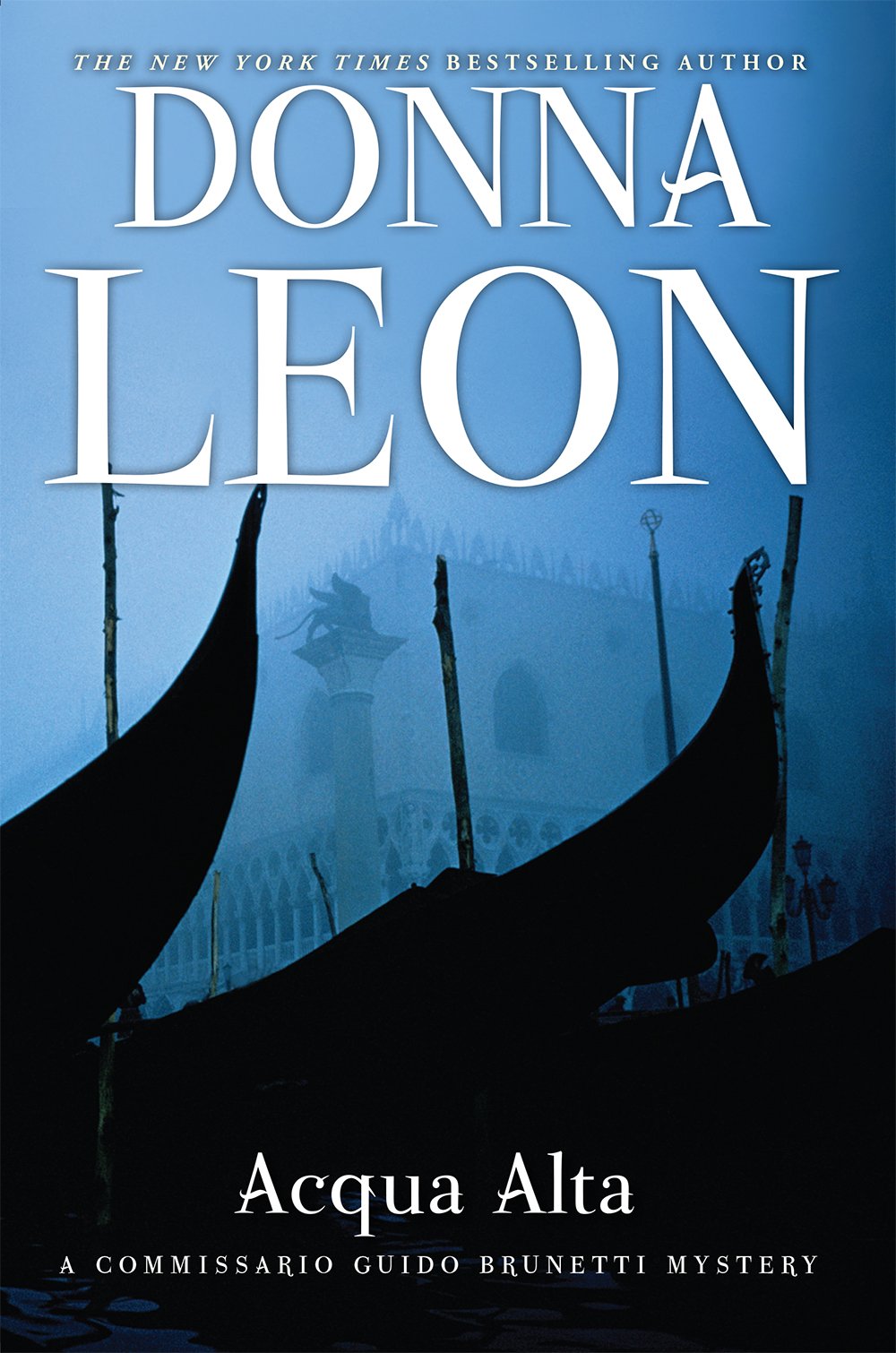 In Acqua Alta we return to two of the characters that Guido met in the first mystery, Death at La Fenice. Brett Lynch is beaten in the doorway of her own apartment. When Guido discovers what has happened he goes to her hospital where he again meets Flavia Pitrelli, with whom he did not have the most cordial relationship several years before. First they must discover why Brett was beaten. Then, when other deaths follow, they must discover how those deaths are related to the assault against Brett.
In Acqua Alta we return to two of the characters that Guido met in the first mystery, Death at La Fenice. Brett Lynch is beaten in the doorway of her own apartment. When Guido discovers what has happened he goes to her hospital where he again meets Flavia Pitrelli, with whom he did not have the most cordial relationship several years before. First they must discover why Brett was beaten. Then, when other deaths follow, they must discover how those deaths are related to the assault against Brett.
Guido's humanity shines through in this story just as strongly as it does in the previous stories. What isn't as strong, however, is the mystery. Unlike previous book, I was pretty sure that Brett and Flavia were going to survive–it would have been unnecessarily cruel to bring them back just to kill one of them off, and we got to know few other characters, so there was little sense of loss related to the deaths.
Additionally, the scenes with Guido at home with his family seemed almost tacked on, as opposed to these vignettes as they appear in other stories. He still loves his family, but the familial interludes seemed to me to lack the depth of earlier episodes.
We also left Guido's POV several times to return to Brett. Although this allowed us to follow her part of the story when Guido was absent, it also made her danger less immediate. To her know thoughts as the story passed seemed to say that she would survive to the end of the story to share those thoughts, so her danger, although immediate and severe, as not deadly.
The other off note was that although we began the story with Brett, and returned to her POV several times throughout the story, she is somehow abandoned at th end of the story. Flavia mentions Brett several times, but the shift from knowing what Brett was thinking and feeling to hearing about her third hand was distinctly unsatisfying.
Don't get me wrong, this was a very good book. I just felt the ending wasn't nearly as strong as previous books.
Published by Grove Press
- May 2008 | Rating: 7/10
- August 2013 | Rating: 7/10
- October 2015 | Rating: 8/10
Quietly in Their Sleep (1997) #6
 The 6th Commissario Brunetti mystery finds Brunetti in charge while
Patta is on vacation. It also finds a young woman in his office with
claims of patients at a nursing home being murdered for the legacy
they left to the church and home.
The 6th Commissario Brunetti mystery finds Brunetti in charge while
Patta is on vacation. It also finds a young woman in his office with
claims of patients at a nursing home being murdered for the legacy
they left to the church and home.
'No, Commissario, it's not your mother. Nothing will happen to her.' She paused then, embarrassed at how that sounded and at the grim truth contained in her words: the only thing that could ever again happen to Brunetti's mother was death.
Except that Suor'Immacolata is no longer around to calm Brunetti's mother.
Sadly, things seem to be the same around the world.Suor'Eleanora, a woman whom the course of years had turned sour and to whom the vows meant poverty of spirit, chastity of humour, and obedience only to some rigorous concept of duty. The fact that his mother could be, even if for an instant, in the care of this woman enraged him as a man; the fact that the casa di cura was considered to be one of the best available shamed him as a citizen.
This was a rather strange story in comparison to the previous books. Brunetti is given only a vague idea that there might be something untoward happening in a nursing home–a home that is run by the same man as the home in which Brunetti's mother resides. It is this personal interest that draws Brunetti into trying to determine if something untoward has happened or not.
What he ends up discovering is far more–and far worse–than he expected.
As with Death and Judgment there are entanglements with Brunetti's home life that complicate matters. And to be honest, it was this complication that I felt was the weakest part of the book. The parallels of his case and the issue at home seemed a little too pat and things fell into place a little too neatly. Donna Leon almost makes up for it with the parallel resolution of the two cases.
It is also interesting to see how Brunetti is readily willing to accept extra-ordinary means–means that are outside the bounds of the law–when it is useful to him, even as he privately rails again similar powers being used against him.
Essentially, we were setting Brunetti change and learn to use whatever means he has at hand to fight for what he believes to be right, even if those means are outside the normal legal bounds and channels.
And that is what saves this book.
If you have not read a Commissario Guido Brunetti, you should be easily able to begin the series here. However, as the strongest part of this book is seeing how much Brunetti has changed since we first met him in Death at La Fenice, I would recommend starting at the beginning and then reading your way to this book.
Published by Penguin
- June 2008 | Rating: 7/10
- September 2013 | Rating 7/10
- October 2015 | Rating: 8/10
A Noble Radiance (1998) #7
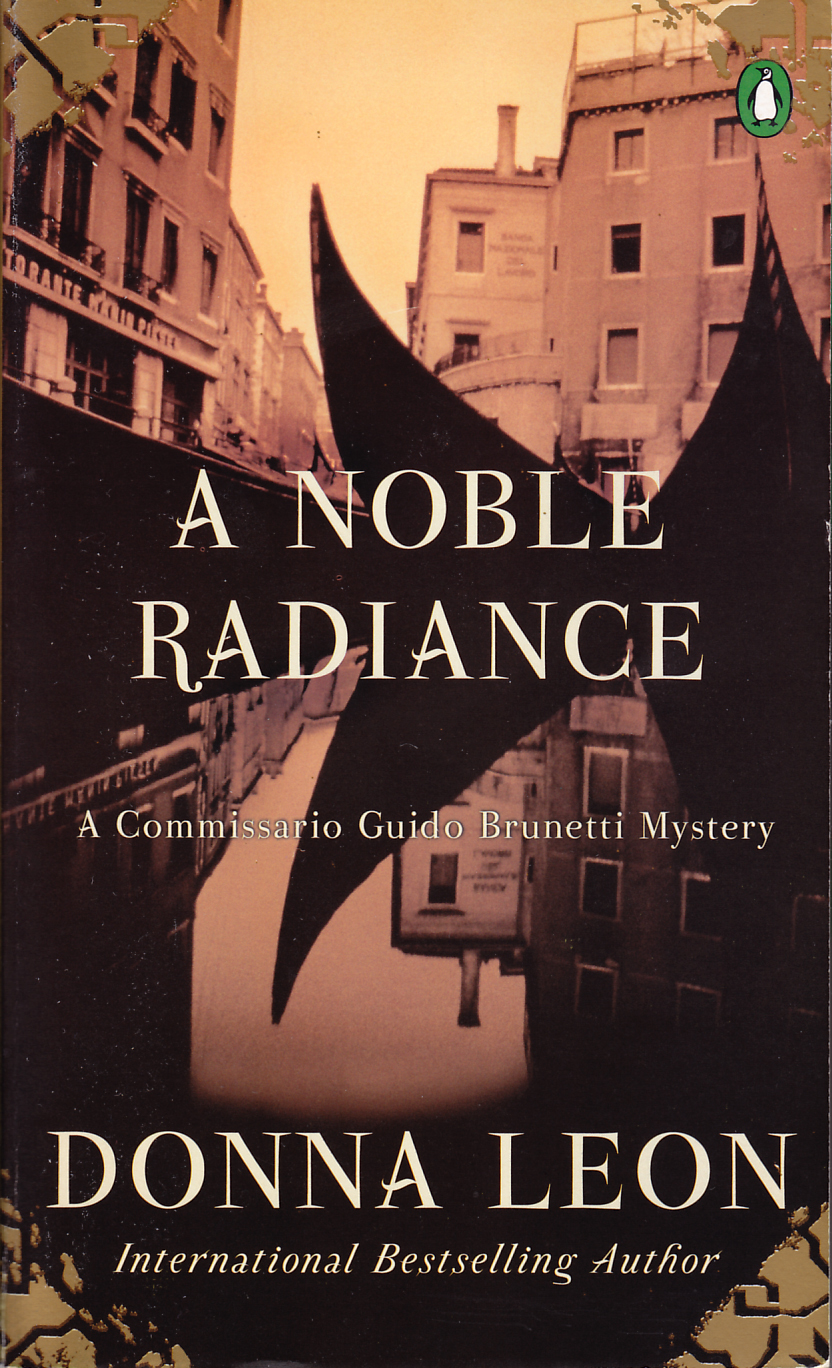 The Commissario Guido Brunetti series continues with A Noble Radiance.
The Commissario Guido Brunetti series continues with A Noble Radiance.
A body is discovered in mountains–a body that had been hastily buried in a shallow grave some time before. The only immediately identifying feature is a signet ring–the ring of a family whose son had been kidnapped and held for random two years before.
This was an especially dark story, and I learned more about Italian kidnapping than I ever wanted to know, such as the fact that the Italian government seizes the assets of the victim's family, so they can't pay the ransom, so as not to encourage other kidnappings.
Pretty horrible, all around, that.
That's not to say there aren't amusing bits.
Ah, rumor.By bedtime, the skull had been variously reported to ave been shattered by a blow from an axe, or a bullet, and to display signs that an attempt had been made to dissolve it with acid. The police had determined, people were certain, that they were the bones of a pregnant woman, a young male, and the husband of Liugina Menegaz, gone off to Rome twelve years ago and never heard form since.
I am really enjoying this series. I like Brunetti, his attitude, and his sense of justice. I also like that although the criminal may be known, that does not mean that justice is always served. I also really like Paola. Sometimes spouses and significant others seemed to appear in mysteries only the further flesh out the main character. But Paola is a strong character, and to be honest, one I wouldn't mind reading about myself even though I'm not sure how exciting a book about an English literature professor in Italy would be. But the point is I'd like to spend time with Paola, the say way I enjoy spending time with Burnetti.
Even with a history of complex cases, this one took so many strange twists and turns I was never quite sure where it was going, until everything suddenly fell perfectly into place. I picked up hints and pieces that Brunetti seemed to be ignoring, but I didn't know what to do with them any more than he did.
Like the previous books in the series, you should be able to begin reading anywhere. This book mentions previous cases, but these is nothing mentioned that would ruin earlier books, and should be too confusing for someone starting the series at this point.
Published by Penguin
- July 2008 | Rating: 7/10
- September 2013 | Rating: 7/10
- October 2015 | Rating: 7/10
Fatal Remedies (1999) #8
 I started Fatal Remedies immediately after I finished A Noble Radiance, wasn't sure about the direction the story was taking, and then picked it up again today, as I have a whole stack of Guido Brunetti books waiting to be read.
I started Fatal Remedies immediately after I finished A Noble Radiance, wasn't sure about the direction the story was taking, and then picked it up again today, as I have a whole stack of Guido Brunetti books waiting to be read.
This is one of my least favorite Brunetti stories, for a very specific reason.
The story opens with Paola breaking the window of a travel agency. She does it for noble reason–she wants to make people aware of how these businesses were promoting the sex trade to third world countries.
But.
Paola isn't stupid. She grew up in Venice, the daughter of the nobility (so to speak). She knew the affect her actions would have upon Guido's career.
And she didn't care, and then she acted surprised when Brunetti suffered repercussions.
It was an incredibly selfish action, wrapped in the nobility of a good deed.
That act of stupidity and selfishness all but ruins the book for me, even though I found the mystery itself quite interesting.
What I was unsure about was how things were going to turn out between Guido and Paola. As his marriage is one of the centers of his world, any threat to the stability made me unhappy. However, that concern rapidly disappeared as the situation turned deadly.
As always, Donna Leon is good at pointing out the inadequacies of the legal system, and how easy it would be for a good man to begin to work outside the system, as so many other police in the system did. So I very much enjoyed Guido (mostly) sticking to his principles, and for once meeting a lawyer who was much the same as him.
But the book also probes more deeply into the question of what action is moral when immoral actions seem to be allowed by the legal system. No answers are provided, but in the corruption of Guido's Venice, it is as always an interesting question to consider.
As with all the books so far in the series, you should easily be able to read Fatal Remedies even if you have read no other books in the series. However, I will note that Paola's actions and beliefs–and Brunetti's reactions to them–may seem strange to someone who has not been reading the series.
Published by Penguin / Grove Press
- July 2008 | Rating: 8/10
- September 2013 | Rating: 5/10
- NOTE: I am fascinated how my opinion of Fatal Remedies changed over time.
- October 2015 | NR
Friends in High Places (2000) #9
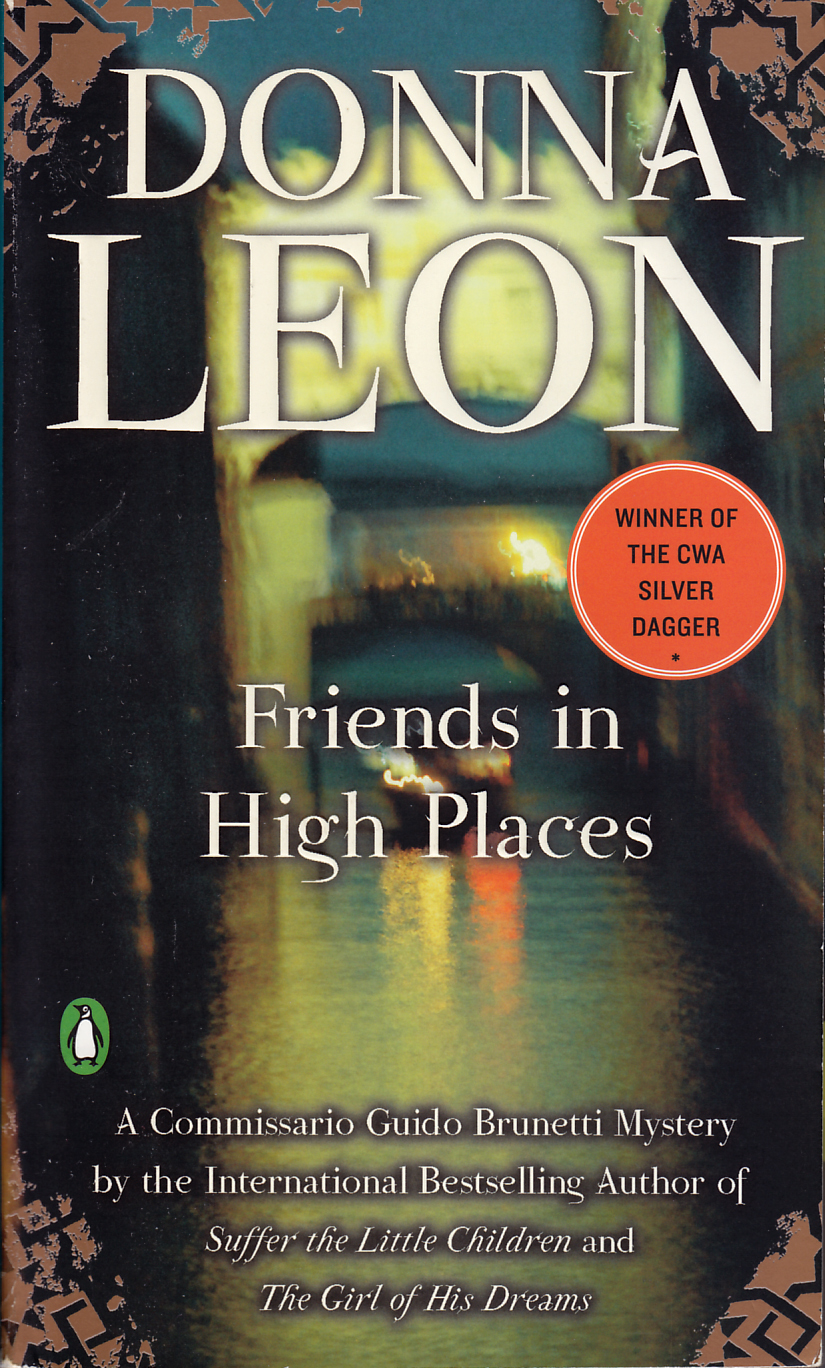 Apparently, Donna Leon's Commissario Brunetti books are not being published in the US following European copyright dates. Friends in High Places has a European copyright of 2000, but was published in the US only recently. Not that this particularly matters in the grand scheme of things, as the Brunetti books can be read out of order, it's mildly annoying. Of course it also means maybe one of two other earlier books will be republished in the US.
Apparently, Donna Leon's Commissario Brunetti books are not being published in the US following European copyright dates. Friends in High Places has a European copyright of 2000, but was published in the US only recently. Not that this particularly matters in the grand scheme of things, as the Brunetti books can be read out of order, it's mildly annoying. Of course it also means maybe one of two other earlier books will be republished in the US.
The insanity of this both makes me giggle and horrifies me, because that is precisely how bureaucracy works.'I'm afraid there is some doubt as to the official status of your apartment.'
'"Official status"?' Brunetti repeated, looking off to the left of Rossi, to the solid wall and then up to the equally solid ceiling. 'I'm not sure I understand what you mean.'
'There's some doubt about the apartment,' Rossi said with a smile that Brunetti thought looked a bit nervous. Before Brunetti could again ask for clarification, Rossi went on, 'That is, there are no papers in the Ufficio Catasto to show that building permits were ever granted for this entire floor, or that they were approved when it was built or,' and here he smiled again, 'that, in fact, it was ever built.' ... I'd like to know what all this means, Signor Rossi. Is there some dispute about our ownership of this apartment?'
Rossi gave his nervous smile again. 'I'm afraid it's a bit more complicated than that, Signor Brunetti.'
Brunetti had no idea what could be more serious than that. 'What is it, then?'
'I'm afraid this apartment doesn't exist.'
As the book begins, Brunetti is interrupted from his relaxation by a man from the Ufficio Catasto–apparently no plans were ever filed for Brunetti's apartment, and as far as the city is concerned this means the apartment does not exist. This annoying and frustrating encounter leads Brunetti to a confusing web of deceit–and because this is a mystery series, murder.
It's interesting to see the chain of events unfold, and to see how only accidental circumstances lead Brunetti to investigate this murder.
What is also interesting is that several other mysteries and deaths appear along the way, and Brunetti must decide which deaths relate to his cases and which do not. I also found the resolution of the story very interesting. As with Donna Leon's other books, the resolution is not what you would expect in an American murder mystery, and justice is never quite the way you expect it.
Published by Grove Press
- October 2008 | Rating: 7/10
- September 2013 | Rating: 7/10
- October 2015 | Rating: 8/10
A Sea of Troubles (2001) #10
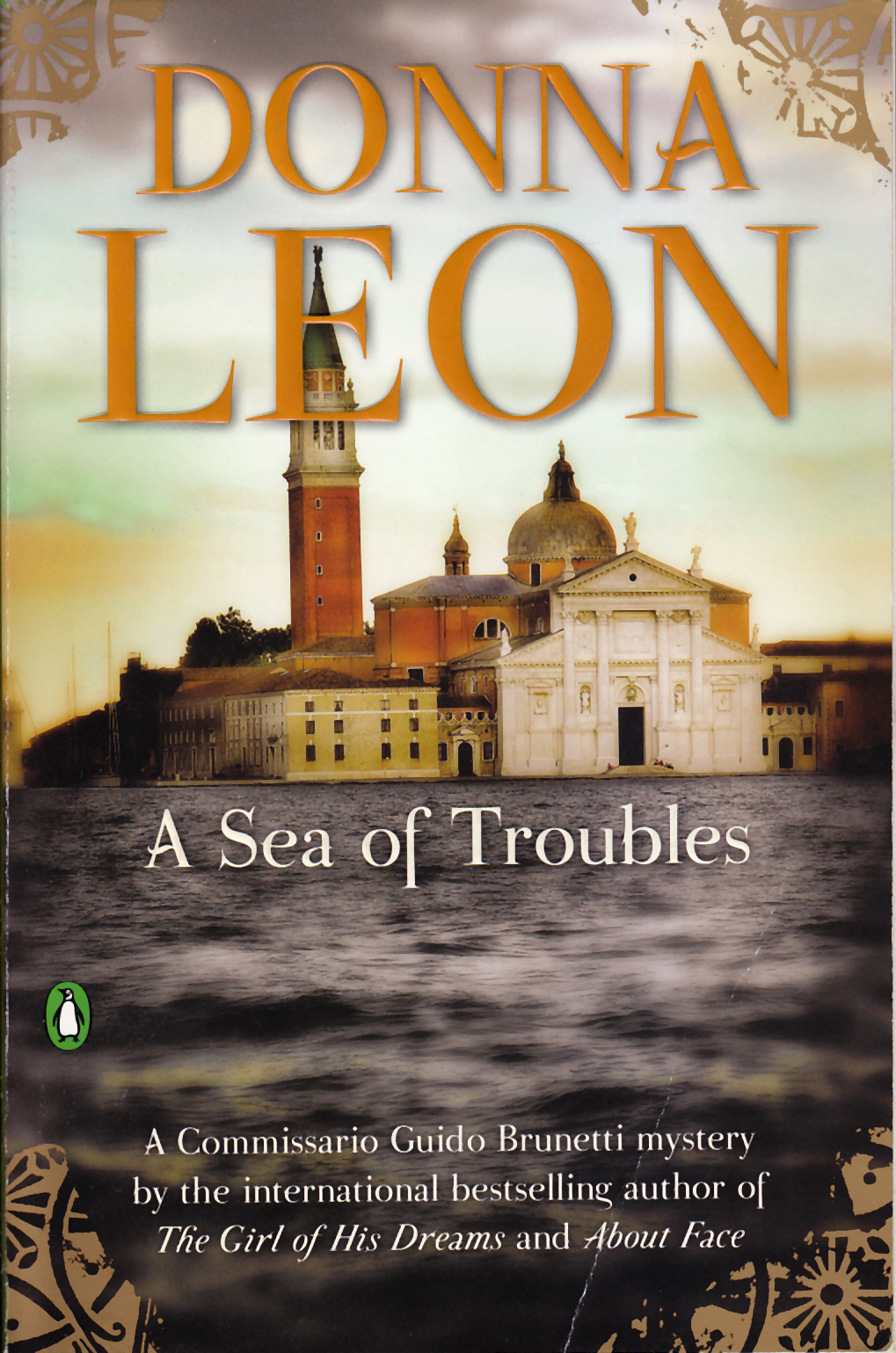 I am failing to understand the hows and whys of Penguin's publishing schedule for Donna Leon's Commissario Guido Brunetti series. A Sea of Troubles was first published in 2001, but was published by Penguin and released in the US only this year (2009). Additionally, there was not notice this was an older book, which meant I was very confused as to Vianello was back in uniform until I checked the copyright date.
I am failing to understand the hows and whys of Penguin's publishing schedule for Donna Leon's Commissario Guido Brunetti series. A Sea of Troubles was first published in 2001, but was published by Penguin and released in the US only this year (2009). Additionally, there was not notice this was an older book, which meant I was very confused as to Vianello was back in uniform until I checked the copyright date.
Now if this had been a so-so book, I could have seen them putting off republication, however, this was not a so-so book; it was excellent.
The tenth Commissario Brunetti mystery finds Signorina Elettra deciding to take a more active role in the investigation of the murders of a fisherman and his son.
A fishing boat is found burned and the bodies of the fishermen are found inside. Brunetti goes to the scene to investigate, however, the small fishing community refuses to share anything with him.
One of the reasons I am particularly annoyed by the publication order of the books is that we learn a lot about Signora Elettra and this book is really a turning point in her relationship with Burnetti and Vianello. And of course the mystery is very good.
SPOILER
Don't get me wrong–I really like Signora Elettra. However, I really enjoyed her part in this story, and I liked how she wasn't able to everything she thought she could.But I think much of the drama of her safety was ruined by the fact that I knew nothing too serious happened to her, since she's relatively unscathed in later books. And I was pretty sure that Montisi was going to get killed, considering later books talk about the young new pilot. So the suspense there was also ruined.
END SPOILER
If you like Donna Leon, you'll want to make sure to read A Sea of Troubles. If you haven't read any books in the Commissario Guido Brunetti series, I highly recommend them, and although you could start here without difficultly, you'll probably enjoy it more if you start at the beginning of the series.
Published by Grove Press
- September 2009 | Rating: 8/10
- October 2015 | Rating: 8/10
Willful Behavior (2002) #11
 One of Paola's students asks her if Brunetti can answer a legal
question for her. Brunetti says he can't give her a clear answer
without knowing more about her question, and the answers she does give
him only lead to more questions.
One of Paola's students asks her if Brunetti can answer a legal
question for her. Brunetti says he can't give her a clear answer
without knowing more about her question, and the answers she does give
him only lead to more questions.
It also sidles up to a subject about which I know very little: the part Italy played in WWII.
'Just like the French, we couldn't forget what happened during the wars fast enough… (T)o give (the Germans) credit, they looked at what they did.
'Did they have a choice?' Brunetti asked.
'With Communists in charge of half the country, the Cold War begin, and the Americans terrified which way they'd go. of course they had a choice. The Allies, once the Nuremberg Trials are over, would never have pushed the Germans' noses in it. But they chose to examine the war years, at least to a certain degree. We never did, and so there is no history of those years, at least none that's reliable.'
It's another good story, that I enjoyed.
Published by Grove Press
- August 2009 | Rating: 8/10
- September 2013 | Rating: 7/10
- November 2015 | Rating: 8/10
Uniform Justice (2003) #12
 I really like Commissario Guido Brunetti. I like his sense of justice and fairness. I like his intelligence and wit. And I like his wife. In fact I think I wish I was Paola.
I really like Commissario Guido Brunetti. I like his sense of justice and fairness. I like his intelligence and wit. And I like his wife. In fact I think I wish I was Paola.
A boy is found dead in the local military school, and it's immediately filed as a suicide. However, the father was not only in Parliament, but had been forced to retire for being too honest. So Brunetti wants to see if the boys death could have been something other than suicide.
As usual in Venice, politics and corruption are at the heart of every case, and Brunetti continues to learn that discovering the truth does not always mean bringing criminals to justice.
This is an exceptionally depressing story.It starts with a young man–a boy, really–found dead. Hanging in the restroom of a military academy.
Yeah. Depressing.
Suddenly he had a vision of what it must have been for the Moros to attempt to remove evidence of Ernesto's presence from their homes, and he thought of the danger that would remain behind: a single, lonely sock found at the back of a closet could break a mother's heart anew; a Spice Girls disc carelessly shoved into the plastic case meant to hold Vivaldi's flute sonatas could shatter any calm. Months, perhaps years, would pass before the house would stop being a minefield, every cabinet or drawer to be opened with silent dread.
But there was a lovely part about family and the people you love, how, when you love your family, you move past politics and beliefs because they don't matter.
But, it was still really sad, from beginning to end.
Published by Grove/Atlantic, Inc.
- October 2008 | Rating: 7/10
- September 2013 | Rating: 8/10
- November 2015 | Rating: 7/10
Doctored Evidence (2004) #13
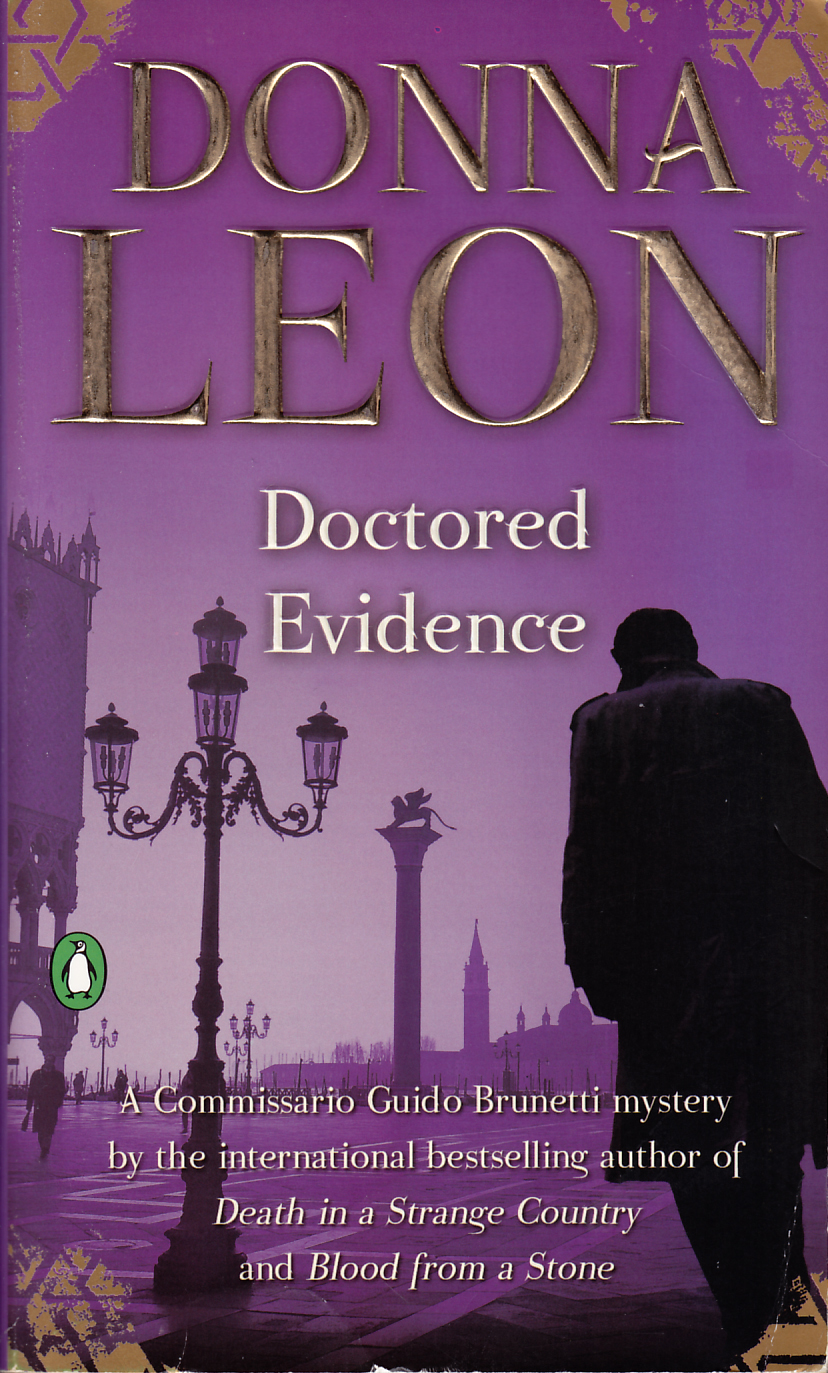 An unpleasant old woman is found murdered–bludgeoned to death in
her apartment. It seems like an open-and-shut case of the
badly-treated hired help having done it–especially when the woman is
found fleeing the country and is hit by a trail and killed trying to
escape the police.
An unpleasant old woman is found murdered–bludgeoned to death in
her apartment. It seems like an open-and-shut case of the
badly-treated hired help having done it–especially when the woman is
found fleeing the country and is hit by a trail and killed trying to
escape the police.
The interesting thing about this story is the book pretty much opens with the shocking injustice, rather than ending with it, the way these books normally do.
It also takes a close look at Brunetti's relationships with Scarpa, which is extremely negative. Brunetti doesn't get along with Patta or Scarpa, but the relationship with Scarpa is far more negative and dangerous.
'It's because he hates you. I'm not important enough for him to hate. And he's afraid of Elettra.'
Brunetti's first impulse was to object to this interpretation, but he forced himself to think it through. He realized he found it unsatisfactory because it made Scarpa out to be less of a villain than he wanted him to be: guilty only of spite, not conspiracy.
And of course, events in at home make an appearance in the story.
I found this passage to particularly resonate.
…(B)y thinking eschatologically,' he said: 'Death. Judgement. Heaven. Hell.'
'You don't really believe in any of that, do you?' asked an astonished Paola.
'There are times when it would be nice,' he said…
Yes, there are.
Published by Penguin
- October 2008 | Rating: 8/10
- September 2013 | Rating: 7/10
- November 2015 | Rating: 7.5/10
Blood from a Stone (2005) #14
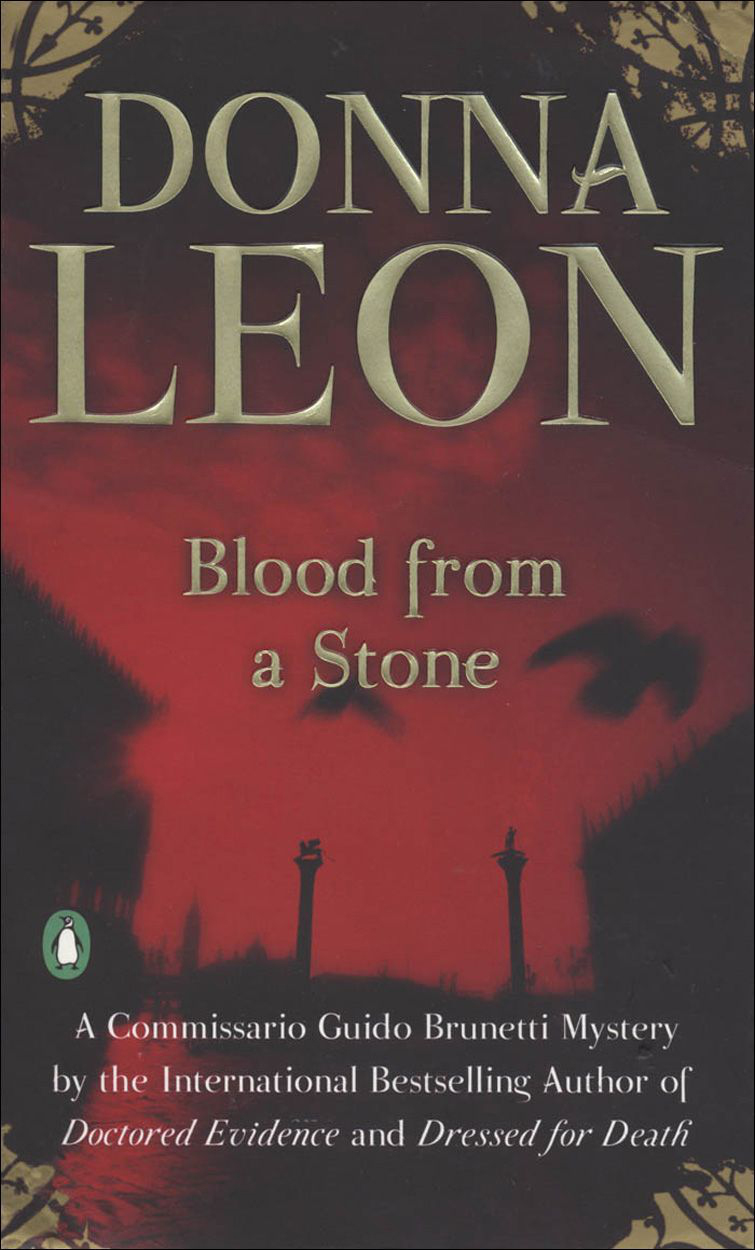 A young man–a vu cumpra–is assassinated on the streets a
few days before Christmas. As always, Patta is up to his neck in the
politics. And as always, this conflicts with Brunetti's search for the
truth and justice.
A young man–a vu cumpra–is assassinated on the streets a
few days before Christmas. As always, Patta is up to his neck in the
politics. And as always, this conflicts with Brunetti's search for the
truth and justice.
Weirdly, I'd remembered part of the mystery, which is inherently political, but I'd forgotten how much more political the story gets.
Which makes it excessively depressing.
There was a nice spot–the ex-priest Don Alvise. He was really a lovely man.
In his letter to Don Alvise…the bishop explained his motives by stating that 'some of these people worship stones.' … Don Alvise wrote to his bishop, explaining that he saw no other course open to him than to renounce his vocation, for to continue to live it as he thought it should be lived was clearly to create perpetual strife with his superiors. In closing, he added, in the most respectful terms, that he would prefer the company of people who worshiped stones to that of people who had them in place of hearts.
I really did like Don Alvise.
He seemed a man who gazed in all he saw with approval and affection, who began every exchange with deep and abiding regard for the person in front of him.
That is a really hard thing to do.
Sadly, we don't get to spend the whole story with Don Alvise, and the story as a whole is really dark and depressing. Probably because it seems so very likely.
Published by Penguin
- October 2008 | Rating: 7/10
- September 2013 | Rating: 7/10
- November 2015 | Rating: 8.5/10
Through a Glass, Darkly (2006) #15
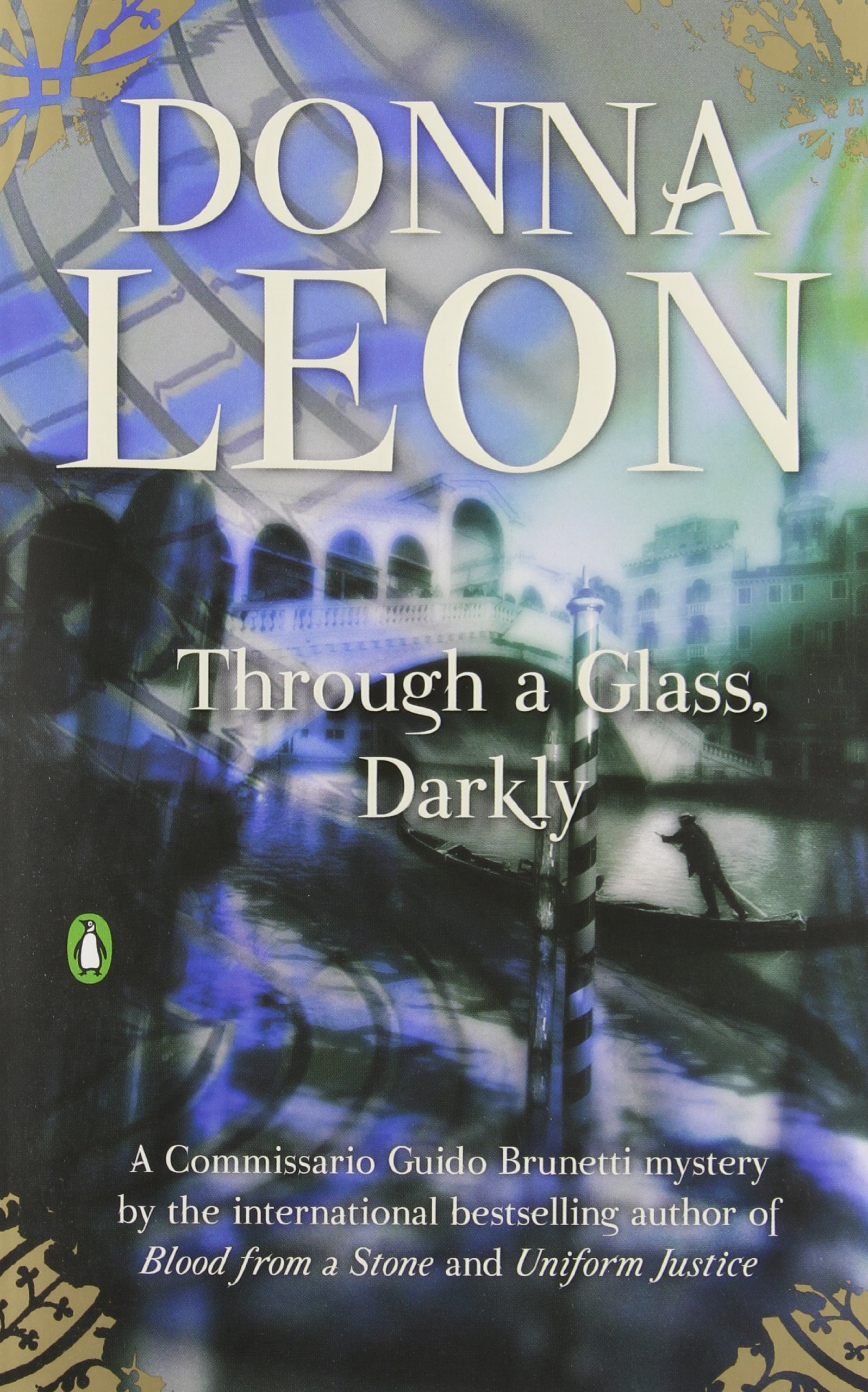 I've been trying to slowly read–to savor–Donna Leon's Commissario Brunetti books. However, being home sick I've read through several in the past couple days, and having finished Through a Glass, Darkly have only one published paperback left. (There are a couple of books that were not republished in the US, so I haven't been able to read them either, but I wasn't counting them.)
I've been trying to slowly read–to savor–Donna Leon's Commissario Brunetti books. However, being home sick I've read through several in the past couple days, and having finished Through a Glass, Darkly have only one published paperback left. (There are a couple of books that were not republished in the US, so I haven't been able to read them either, but I wasn't counting them.)
Vianello comes to Brunetti to ask for assistance in getting a friend out of trouble. Vianello's friend is also an environmentalist, and was arrested at a protest. This seemingly unremarkable incident leads Burnetti to discover that things are not necessarily so clear at the glass factories in Murano, and a tangled series of events leads Brunetti to an even more tangled investigation.
As usual, I find it fascinating how the Brunetti's case are–and are not–resolved. Even when Brunetti learns who the perpetrator is, true justice within the legal system does not always come with the revelation. Even more interesting are the facts and ideas that push Patta to encourage or discourage Brunetti for looking into various cases.
Brunetti continues to lean on Signora Elettra and Vianello, and continues to battle with Patta over what should be done regarding any particular case. What I find interesting is that Brunetti's relationship with Patta is far more hostile here than it has been in the past. Either because Brunetti has grown tired of playing Patta's games, or because Patta has realized that Brunetti has been playing with him. Rgardless, there was a higher level of hostility here that I was used to seeing.
Aside from that, the story was complex, and wandered around a bit before getting to the point, which I thought was interesting, although a bit of a red herring that seemed to fail–at least in my case. And as usual, Brunetti spent a lot of time eating–or forgetting to eat. Which as I'm home sick was frustrating to read, as I'd love to eat some of the dishes described within the covers, rather than chicken noodle soup.
As with the other books in this series, you should be able to read Through a Glass, Darkly, without having read any previous Brunetti books.
Published by Penguin
- October 2008 | Rating: 7/10
- October 2013 | Rating: 6.5/10
- November 2015 | Rating: 7.5/10
Suffer the Little Children (2007) #16
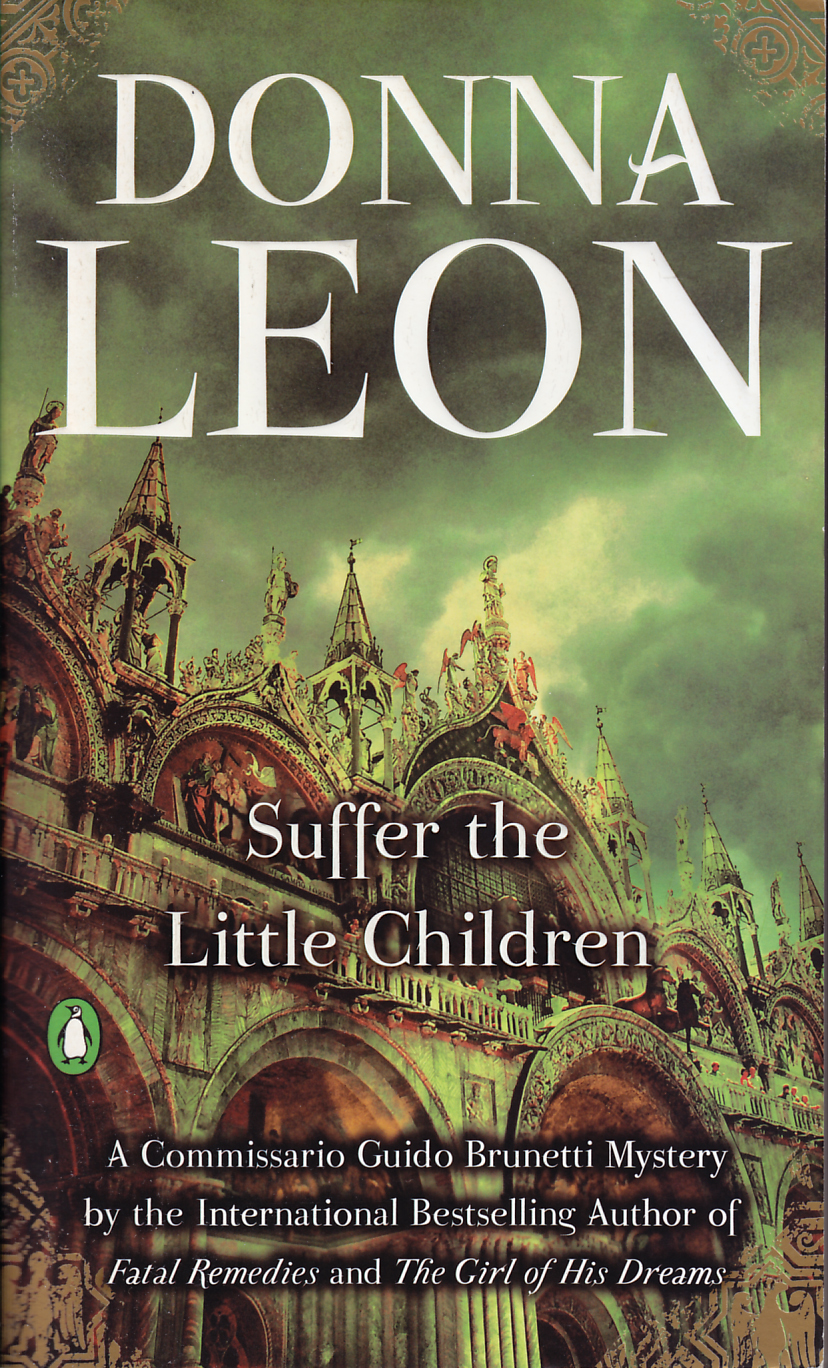 Brunetti is called to the hospital for an assault case, where it turns out that a citizen of Venice has been injured, only the assault isn't what he was expecting, and draws Brunetti into a case of illegal adoptions.
Brunetti is called to the hospital for an assault case, where it turns out that a citizen of Venice has been injured, only the assault isn't what he was expecting, and draws Brunetti into a case of illegal adoptions.
I'd been saving Suffer the Little Children for months, since it's the last Brunetti book out in paperback.
I'm sorry I waited.
I've been rather blue recently, so I thought this would be the perfect time to read a Commissario Brunetti book.
It wasn't.
First of all, the quality of writing was fine. There were passages I loved, such as the following:
Because Paola had agreed to help him by asking around about (), Brunetti steeled himself and went down to the computer in the officers' room, where he managed to surprise his colleagues by the ease with which he connected to the Internet and then typed in the letters for '()', having to go back and correct only two typing errors.
Brunetti remains himself, dedicated to Paola and proud of his children, and sticking with his job, even if he finds it maddening at times.
And that's where things fell apart for me.
mild SPOILERS
Although we learn what happens, nothing is resolved in a satisfactory manner. All kinds of bad things happen–many happen to innocent people–and no one is prosecuted for anything. This isn't unusual for a Brunetti book, but the specifics of the involvement in children who were completely innocent, and the horrible pharmacist ended the story on a completely depressing note.
Not what one needs when already suffering from the blues.
END SPOLIERS
It was an OK book, but it was definitely not at all what I wanted to read. If I'd read it at another time, I would have liked it more.
If you have not read a Brunetti book, you should be able to start here without much difficulty. But I'm not sure this is a good place to start.
Published by Atlantic Monthly Press
- February 2009 | Rating: 6/10
- November 2015 | Rating: 8/10
The Girl of His Dreams (2008) #17
 This has all of the elements I've come to expect of a Commissario Guido Brunetti mystery–death, intrigue, good food, and corrupt Italian politics.
This has all of the elements I've come to expect of a Commissario Guido Brunetti mystery–death, intrigue, good food, and corrupt Italian politics.
The 17th Commissario Brunetti mystery opens with a funeral–Brunetti's mother has finally died. This isn't a cruel statement, just a recognition that she wasn't the woman who raised two sons, but was instead made into a shell of herself by dementia.
The mystery starts when a priest–a friend of Sergio's who said a prayer at the graveside–comes to ask Brunetti about a religious leader who has come to concern the priest.
In this, he comes to talk to her mother-in-law about religion and faith.
'I've chosen to believe in God, you see, Guido. In the face of convincing evidence to the contrary and in the complete absence of proof – well, anything a right-thinking person would consider as proof – of God's existence. I find that it makes life more acceptable, and it becomes easier to make certain decisions and endure certain losses. But it's a choice on my part, only that, and so the other choice, the choice not to believe, is entirely sensible to me.'
'I'm not sure I see it as a choice,' Brunetti said.
'Of course it's a choice,' she said with the same smile, as though they were talking about the children, and he'd just repeated one of Chiara's clever remarks. 'We've both been presented with the same evidence, or lack of evidence, and we each choose to interpret it in a particular way. So of course it's a choice.'
Slightly different from Paola's ideas of religion and faith.
Her voice deepened into disgust and she added, 'It's all so terribly American.'
'Why American?' Nadia asked, reaching for one of the fresh glasses the barman set on the counter.
'Because they think it's enough to feel things: they've come to believe it's more important than doing things, or it's the same thing or, at any rate, deserves just as much credit as actually doing something.
Sadly, I think that the Internet has only made that worse.
This is not to say she presents all Italians as corrupt, after all we have Brunetti and Vianello on the side of the “good guys” working as best they can within a corrupt system. Corruption is more a way of life in Venice than an evil, nevertheless, corruption can lead to evil, and it is this evil that Brunetti seeks to stop.
The story starts with the death of Brunetti's mother. No, not through murder, just an ordinary death–one that has been expected for quite awhile now. The priest who performed the graveside service–a friend of Brunetti's brother–comes to Brunetti asking him to investigate a man who may be swindling Venetian parishioners. Because of his past, and his feelings about religion, Brunetti is actually more suspicious of the priest making the request than of the minister he is asked to investigate.
The heart of the story, however, is the mystery surrounding a the body of a young girl pulled from the river. Brunetti and Vianello are disturbed when no one comes forth to claim the body–the girl was entirely too young for someone not to miss her.
Both Paola and food play a part in this book, but either I've read too many Andrea Camilleri books in the past year, or he didn't talk about food nearly as much as he has previously.
I hadn't love the past several books in this series, but this book marks are return to the writing of some of the earlier book. As with most of this series, you should easily be able to read The Girl of His Dreams without having read any of the previous books in the series.
Published by Atlantic Monthly Press
- August 2009 | Rating: 8/10
- November 2015 | Rating: 7/10
About Face (2009) #18
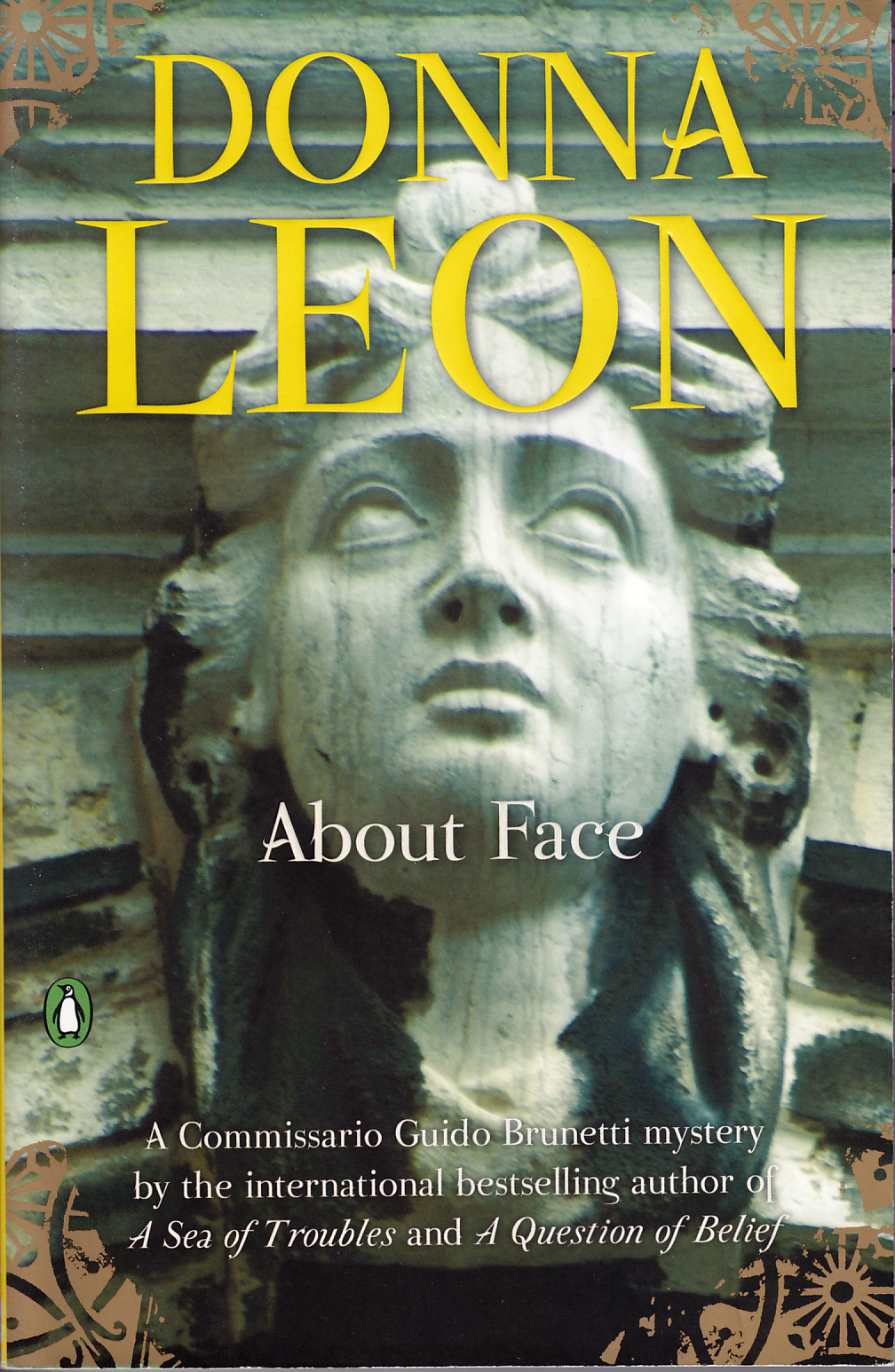 Guido and Paola are invited to a dinner at her parents', and Guido meets a woman who captivates his attention.
Guido and Paola are invited to a dinner at her parents', and Guido meets a woman who captivates his attention.
'I beg your pardon.' Brunetti answered, stalling.
'You beg my pardon because you don't understand my question, or you beg my pardon because you spent the evening talking to Franca Marinello and ignoring everyone else?'
The vehemence of her question surprised Brunetti into bleating out, 'But she reads Cicero.'
'Cicero?' asked an equally astonished Paola. … 'You realize, I hope, that you are married to the only woman in this city who would find that an entirely satisfactory explanation?'
Which is one more reason to love Paola.
After the dinner, Brunetti's father-in-law asks his opinion of the woman's husband–and older man who wants the Comte to invest in his business dealings in China.
At work, Brunetti is asked to work with another officer to look into the death of a businessman, and if that businessman was a Venetian. The murdered man was involved in shipping, and after being caught for tax crimes, was informing the police of dealings with organized crime.
I love Brunetti. I love his attitude and Paola and his love of food (though there seemed to be fewer meals here than in previous books). As with previous books, crime in Venice is complicated and the government is so Byzantine that it is hard to see the differences between the small large crimes (the bribes that allow Venetians to get anything done) from the small large crimes, such as were being uncovered when the businessman was murdered.
As always, despite accepting the small crimes that seem a way of life in Venice, Brunetti continues to rail against the larger crimes and injustices.
Published by Penguin
- October 2010 | Rating: 8/10
- November 2015 | Rating: 8/10
A Question of Belief (2010) #19
 The 19th Commisarrio Brunetti book finds Guido and his family ready
for their vacation in the mountains–and an escape to the oppressive
heat and humidity of Venice.
The 19th Commisarrio Brunetti book finds Guido and his family ready
for their vacation in the mountains–and an escape to the oppressive
heat and humidity of Venice.
Though the heat often drove people to violence, that was not the case this year. Perhaps there was some point where heat and humidity made the effort to throttle or maim too exhausting to be considered.
While he can think of only escape to the mountains, a friend shows him papers possibly linking a judge to delays in the court cases of the wealthy–delays that work in the favor of the judge.
Meanwhile, Vianello is worried about his aunt's expensive interest in astrology, and asks Brunetti to help him look into the issues.
First, Vianello's aunt is worrying her family, because she seems to be giving her money to an astrologer of some sort. It's her money, and she can do as she pleases, but Vianello doesn't want her to be taken advantage of, so he asked Brunetti to help him–unofficially–look into what is happening. Meanwhile, an old schoolmate of Brunetti's appears with questions that may or may not be related to a judge or might, possibly, be behaving in an unethical manner, and the clerk who may or may not be involved in what may or may not be bribery.
As always, the dialog between the characters is a delight.
'You sure the heat hasn't got to you and you're maybe mixing it up with something you might have read in – oh, I don't know – Chi?'
'I don't read Chi, either,' Vianello said primly.
'Nobody reads Chi,' Brunetti agreed, for he had never met a person who would confess to doing so. 'The information in the stories is carried by mosquitoes and seeps into your brain if you're bitten.'
'And I'm the one affected by the heat,' Vianello said.
Sadly, the possible corruption of a judge is the least surprising thing to Brunetti; this is, after all, Venice, where bribery is a way of life, and Brunetti has to manipulate the Vice-Questore to effectively solve crimes. Despite this political and social commentary, the Venice described by Donna Leon–even in the heat of summer–is a place I want to visit. A place of beauty and timelessness, a city that goes on despite the fact it is slowly falling into the sea.
I want to visit that Venice.
Published by Atlantic Monthly Press
- October 2010 | Rating: 7/10
- November 2015 | Rating: 8/10
Drawing Conclusions (2010) #20
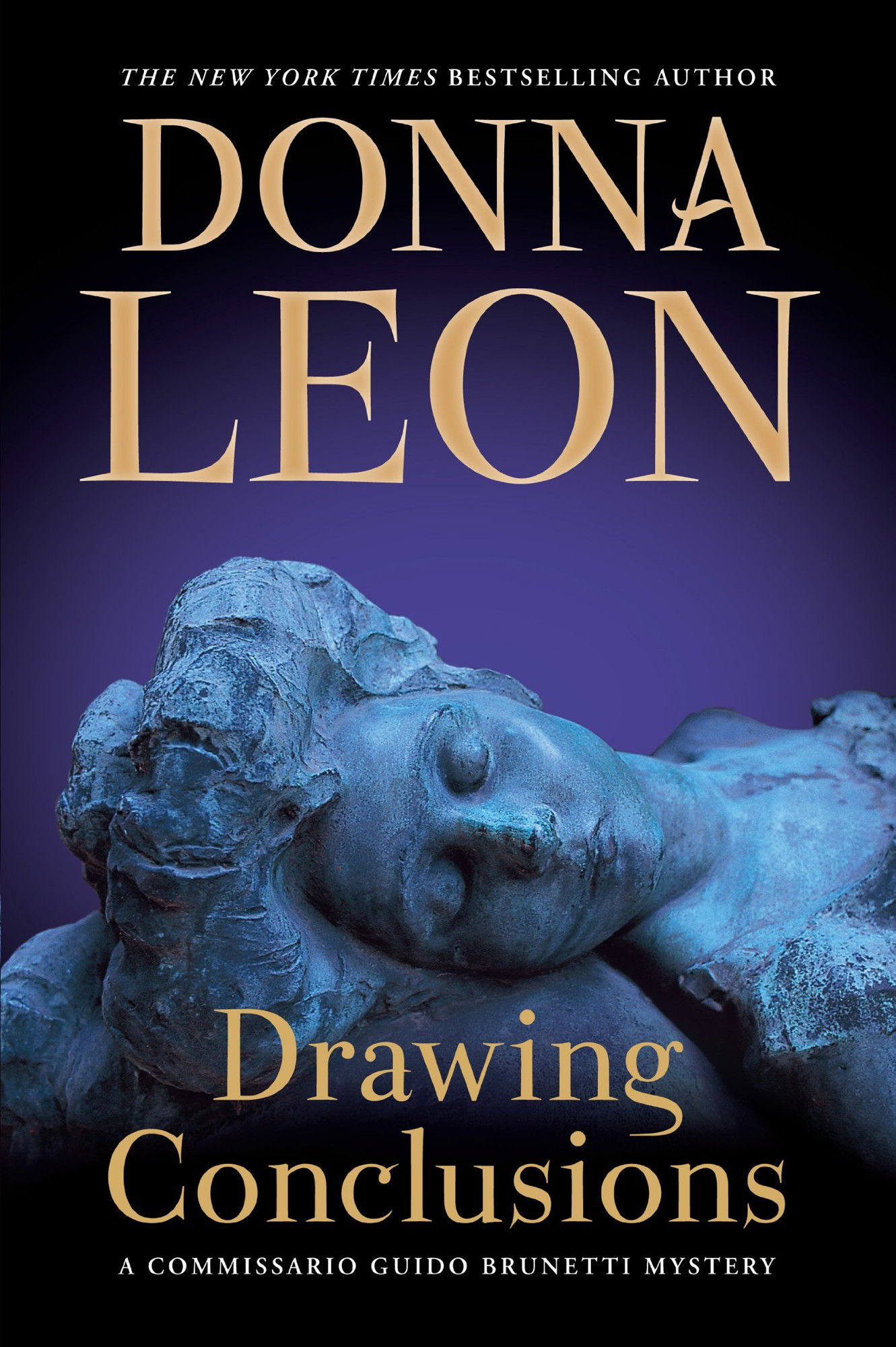 I love Donna Leon's Commissario Brunetti series.
I love Donna Leon's Commissario Brunetti series.
Brunetti is a mostly honest police detective who works in a mostly dishonest and entirely complex system.
He is also in love with his wife and has two decent kids, and has co-workers who respect him.
Of course, everything isn't perfect. His boss is a complete politician who cares only for how things look, and there are men on his squad who are dishonest, stupid, or both. And the system itself works against him, leading many to distrust him solely because he is a police officer, and most police are corrupt.
A young women returns home early from a weekend away to discover her neighbor dead on the floor. Because she sees blood, she calls the police, and Brunetti is one of the first on the scene. Marks on the woman's skin make Brunetti wonder if there is more to this death than it seems.
One of the things I love about this series–besides Brunetti and Paola and the descriptions of food, is the atmosphere. Venice must be an amazing place to live, and as I believe Brunetti says in an earlier book, it's important to appreciate what you have around you, which Brunetti very much does, when he takes time to stop and enjoy Venice.
Plus, there are Brunetti's descriptions of human nature.
'People don't joke about things like this,' she said sharply.
Brunetti was of a different mind entirely, having had plenty of evidence of the human capacity to joke at anything, no matter how terrible. It seemed to him that an entirely legitimate defence against looming horror that could afflict us. In this, he was a great admirer of the British; well, of the British who were, with their wry humour in the face of death, their gallows humor–they even had a word for it–defiant to the point of madness.
Another, entirely different passage, caught my eye.
A shaggy black dog stood on a table precariously balanced on a pile of cardboard boxes at the prow of the boat, its nose pointing forward as bravely as any figurehead. How dogs loved boats. Was it the open air and the richness of scents passing by? He couldn't remember whether dogs saw at long distance or only very close, or perhaps it differed according to what breed they were. Well, there'd be no determining breed with this one: he was as much Bergamasco as Labrador, as much spaniel as hound. He was happy, that was evident, and perhaps that's all a dog needed to be and all Brunetti needed to know about a dog.
If you have not read a Brunetti mystery, you could probably start here, but I highly recommend going back and starting at the beginning. The first book in the series is excellent, and you'll enjoy spending time with Brunetti and his family.
Published by Penguin
- July 2012 | Rating: 7/10
- November 2015 | Rating: 8/10
Beastly Things (2012) #21
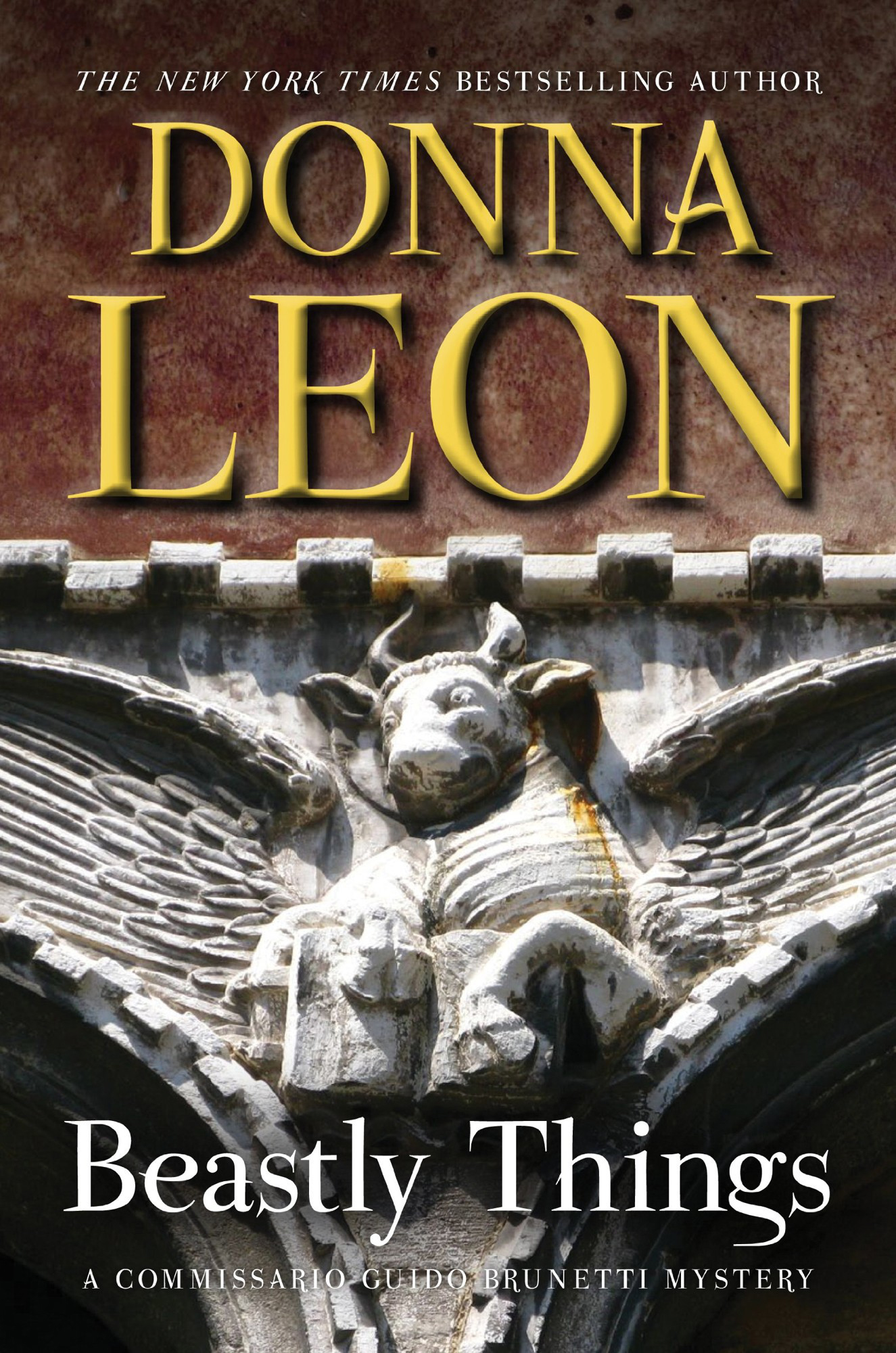 I love this series.
I love this series.
I love spending time in Venice with Commissario Brunetti and has family, I love all the characters he deals with, and I love the complexity of his family and co-workers.
It's funny, but for the most part, the mysteries take a back seat to everything else that occurs in these books–the inevitable murder is simply the vehicle for spending time with Brunetti.
The body of a man is discovered in the canals, and though all identification has been stripped from the body, Rizzardi, the coroner notes his unusual disease, and this leads to the eventual discovery of his identity.
I had only one small complaint about the story–Signorina Elettra is known for her green and earth friendly ways, but I thought the coincidence of her complaint against beef unusually heavy-handed when the murder was going to take us into a slaughterhouse later. It felt like that part could have been left out entirely, as it really served only to foreshadow the later visit to the slaughterhouse.
And a word about the visit to the slaughterhouse: I've read a great deal about slaughterhouses but if you have not, the descriptions will be disturbing. Just so you're forewarned.
One thing I am finding interesting is Brunetti's changing relationships with Signorina Elettra's computer hacking ways. He continues to admire her, for many reasons, but he is slowly coming to realize that much of what she doesn't isn't necessarily legal. But then so much of Venice seems to exist in a grey legal area, so it hardly seems like much to have her bending or breaking laws in the interest of justice.
As a geek, I have to say that I actually appreciate that Brunetti is technologically inept. First, this contrast with Signorina Elettra is something I enjoy, but also, his ineptness requires others to constantly explain the technology to him, and they do so in a way that also explains to the non-geek reader, but in a way that is real–it's what I do all the time, although with more patience that some of Brunetti's co-workers.
All in all, I continue to enjoy this series immensely.
Published by Atlantic Monthly Press
- July 2012 | Rating: 8/10
- November 2015 | Rating: 8/10
The Golden Egg (2013) #22
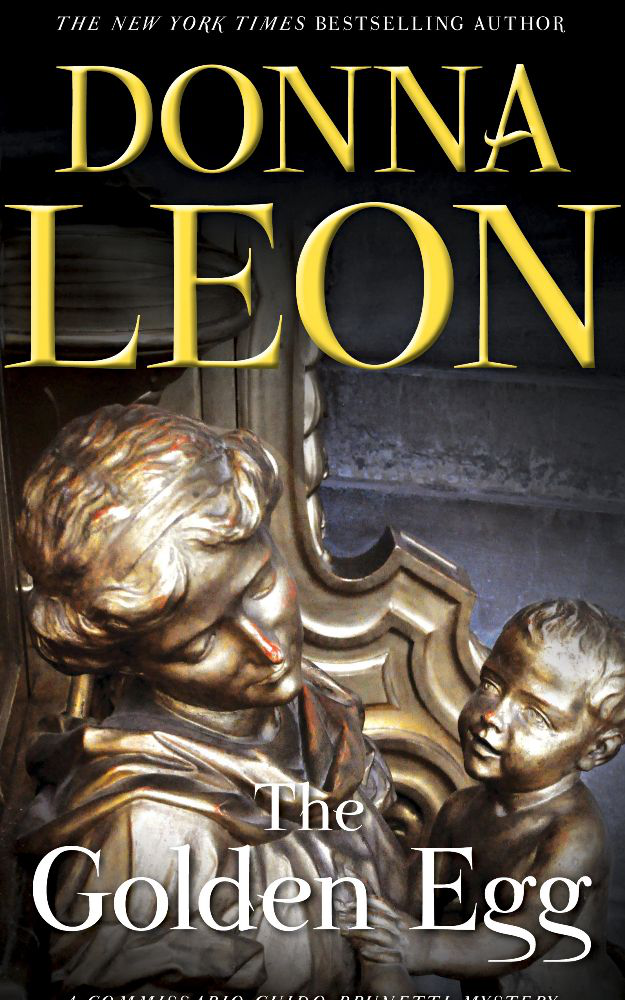 I am starting, perhaps, to be disconcerted by how Brunetti and his family seem to have stopped aging. The first book was written in 1992, so twenty years have passed since that book, but time has not passed at the same rate for Brunetti. It's most obvious with Chiara, who seems to have aged only six or seven years in the intervening time.
I am starting, perhaps, to be disconcerted by how Brunetti and his family seem to have stopped aging. The first book was written in 1992, so twenty years have passed since that book, but time has not passed at the same rate for Brunetti. It's most obvious with Chiara, who seems to have aged only six or seven years in the intervening time.
Donna Leon isn't the first mystery author to have made her detective somewhat flexible in time, but I believe my preference is for characters to age over time–at least when they are written in the present and technology keeps pace with the times. It's not a huge problem, but it's slightly disappointing. I'd like to see Raffi and Chiara grow and mature–in fact, I'd really like to see what kind of woman Chiara becomes.
But that has nothing to do with this mystery.
Paola is disturbed by the death of a young man–a deaf mute–who “worked” at the local cleaner. No one seemed to know much about him, even his name, and so she asks Brunetti to learn what he can. And the more Brunetti learns, the stranger the story becomes, and the more disturbed Brunetti is by how a man could have grown up in Venice and yet exist no where in the system.
'I wonder if it's possible that he got to the point where his life was so bad, he couldn't stand it any more?'
Brunetti thought about this and said, 'He'd have to know it was bad, wouldn't he?'
She turned her head to him sharply, mouth open. But before she could ask him what he meant, Brunetti saw her hear her own question and begin to consider it. Finally she said, 'Of course. If that's the only life he knew, then it was just that: life. Something worse would have to have happened, I suppose.'
That bit is quite chilling, considering the resolution of the mystery.
I admit that some of the mystery seems obvious to me, although that didn't make some of the more disturbing parts both surprising and upsetting.
I enjoyed spending time with Brunetti, but I think the biggest tell about my feelings for the series come from the fact that this book was published last year, and I've only just now gotten around to reading it, and although the next book is on my wish list–it's only on my wishlist, because I'm waiting for the price to drop.
Published by Atlantic Monthly Press
- April 2014 | Rating: 6/10
- November 2015 | I'll skip the rating on this, because I can't separate the feelings the story evoked from the writing.
By its Cover (2014) #23
 At last, we reach the books I had not yet read.
At last, we reach the books I had not yet read.
The 23rd book finds Brunetti called to investigate the theft of both books and pages cut from old and rare books.
Old books had always filled Brunetti with nostalgia for centuries in which he had not lived.
'You get any fingerprints from those books?' he asked, not having had time to speak to Vianello before now.
Vianello took a sip of his wine and said, 'I've never seen those two lab guys so close to tears, both of them.'
'Why?' Brunetti asked, and took a bite of his egg and tuna.
'You ever think of how many people touch a book in a library?' Vianello set his glass down and picked up a sandwich.
'Oddio,' Brunetti said.
This story, of course, gives us plenty of chances to see Brunetti (and Paola)'s love of books.
'(W)e started talking.'
'About his book?'
'No,' she said adamantly. 'I don't read.'
Brunetti nodded in understanding, as if this were the most normal thing in the world.
'We talked about things. Real things.'
Take that, books, Brunetti thought.
As always, Brunetti says / thinks something that tugs at me.
Much as he chided himself for his unmanly behaviour, he could never overcome the continual fear that – in this most peaceful of cities – Paola was somehow in peril the instant she was out of his sight.
I liked this book, not just because it is about books, but because the mystery was good and the characters were so very real.
Published by Atlantic Monthly Press
November 2015 | Rating: 8.5/10
Falling in Love (2015) #24
 And now, I have read and Reread all the published Donna Leon, Commisario Brunetti books.
And now, I have read and Reread all the published Donna Leon, Commisario Brunetti books.
We return once again to the Opera and Flavia Petrelli. La Fenice is putting on Tosca, and Flavia has the lead role. Brunetti and Paola meet her after the opening night, and invite her to dinner–at Paola's parents–on Sunday. It is there that Brunetti notices that Flavia is on edge, and she eventually admits that she has an unknown admirer who is frightening her.
There is far less mystery here, and more interplay and conflict between the characters–Signorina Elettra is finally actively in opposition to Lieutenant Scarpa–but I was totally okay with that. I like this series because of the characters–the mysteries are almost secondary.
As usual, Patta is Patta, but he is far less horrible here than he was initially, and in fact Brunetti actually thinks some positive things about him.
Colleagues of his in other cities and provinces continually told him of the sort of men and women they worked for, hinting – though never daring to say it outright – that some of them had given their allegiance to an institution other than the State, something that could not be said of the Vice-Questore.
Patta had given his, Brunetti had discovered over the years, to his family. Without reservation, without reflection or restraint: Brunetti liked him for it. Patta was vain and lazy, selfish and at times foolish, but these were not active failings. There was a great deal of bluster in the man, but there was no deep malice: that was left to Lieutenant Scarpa.
There was also a very interesting passage:
'Isn't it interesting,' (Paola) said in the voice she used for speculation, 'that longing is so often expressed in physical terms: hunger, thirst, physical safety?'
'What should we long for instead?' Brunetti asked. 'Universal peace?'
'That's not what I'm saying,' Paola insisted. 'I find it interesting that longing is usually expressed in physical terms rather than in spiritual or intellectual ones.'
'It's more immediate,' Chiara said. 'You suffer from physical need: water, food, sleep. You feel it.'
'You suffer more from the lack of freedom or peace of mind, I'd say,' Brunetti offered.
Raffi continued with his cake, as if he found it far more interesting than this sort of speculation.
'But physical pain hurts,' Chiara insisted. 'Nobody dies of a broken heart.'
Paola placed a hand on her own anguished heart. She reached across the table and grabbed at Brunetti's hand. 'Guido, we've raised a savage.'
I've noted in the past that physical pain tends not to bother me much (when I broke my ankle, I told the ER nurse I only rated my pain about a 4 or so) but I have found myself prostrated by mental and emotional pain. So I'd say that I could not disagree more with Chiara's statement.
Was this one of the better mysteries? No, it honestly wasn't. Did I enjoy it thoroughly? Yes, I honestly did.
If you're looking for a complex mystery, or have never read the Commissario Brunetti seires, don't start here. But if you're looking to spend time with characters, and already know Brunetti and Paola and Signorina Elettra, then it's a pleasant time spent.
Published by Atlantic Monthly Press
November 2015 | Rating: 7.5/10
The Waters of Eternal Youth (2016) #25
 This is the 25th book in the Guido Brunetti series, which shouldn't surprise me, yet somehow does.
This is the 25th book in the Guido Brunetti series, which shouldn't surprise me, yet somehow does.
Brunetti remains as astute as ever, with many sharp little comments on life.
Contessa Lando-Continui had always been polite to him, at times even warm, but he had always wondered if he were being treated as an appendage of his wife and mother-in-law. Did most wives feel this way? he wondered.
Not that he doesn't have his blind spots.
When the maid came around again to offer a second helping, Paola caught her husband's eye. He smiled back and shook his head at the maid's offer as if he had meant to do it, failing to persuade Paola but managing to convince himself.
The mystery comes when a friend of his mother-in-law's asks him to look into an incident that caused her granddaughter to be seriously harmed.
We see Rizzardi and of course Signorina Elettra, and Paola and the children.
'Is there anyone in the Records Office who might be able to help?'
'Are you talking about one of my patients, if I might call them that?' the pathologist began. 'Or one of the patients in the wards?' If possible, Rizzardi's voice had grown even more friendly, as if he were enjoying the exchange.
'Someone who was taken to the hospital,' Brunetti answered. 'And who left.'
'Why don't you simply ask the Vice-Questore's secretary to break into the system?' Rizzardi asked affably. 'Unless by now you're able to do it yourself.'
'Ettore,' Brunetti said, 'I think you're not supposed to know about that. Or at least talk about it.'
Although there are many themes about Italy and Venice that have been repeated throughout the series, occasionally, something new is dropped in.
'I remember the first time I went to dinner in London,' she said. 'Everyone at the table was English, except me, and after the first course I realized that only one person spoke at a time. When that person finished, someone else said something, and everyone waited until he or she was finished before commenting. Individually.' She smiled, then laughed, at the memory.
Obviously English. Certainly not any Americans from MY family.
Is this one of the best Brunetti mysteries? No. But it was comforting and lovely to be in Venice with Brunetti and all the others.
Published by Atlantic Monthly Press
March 2016 | Rating: 7/10
Earthly Remains (2017) #26
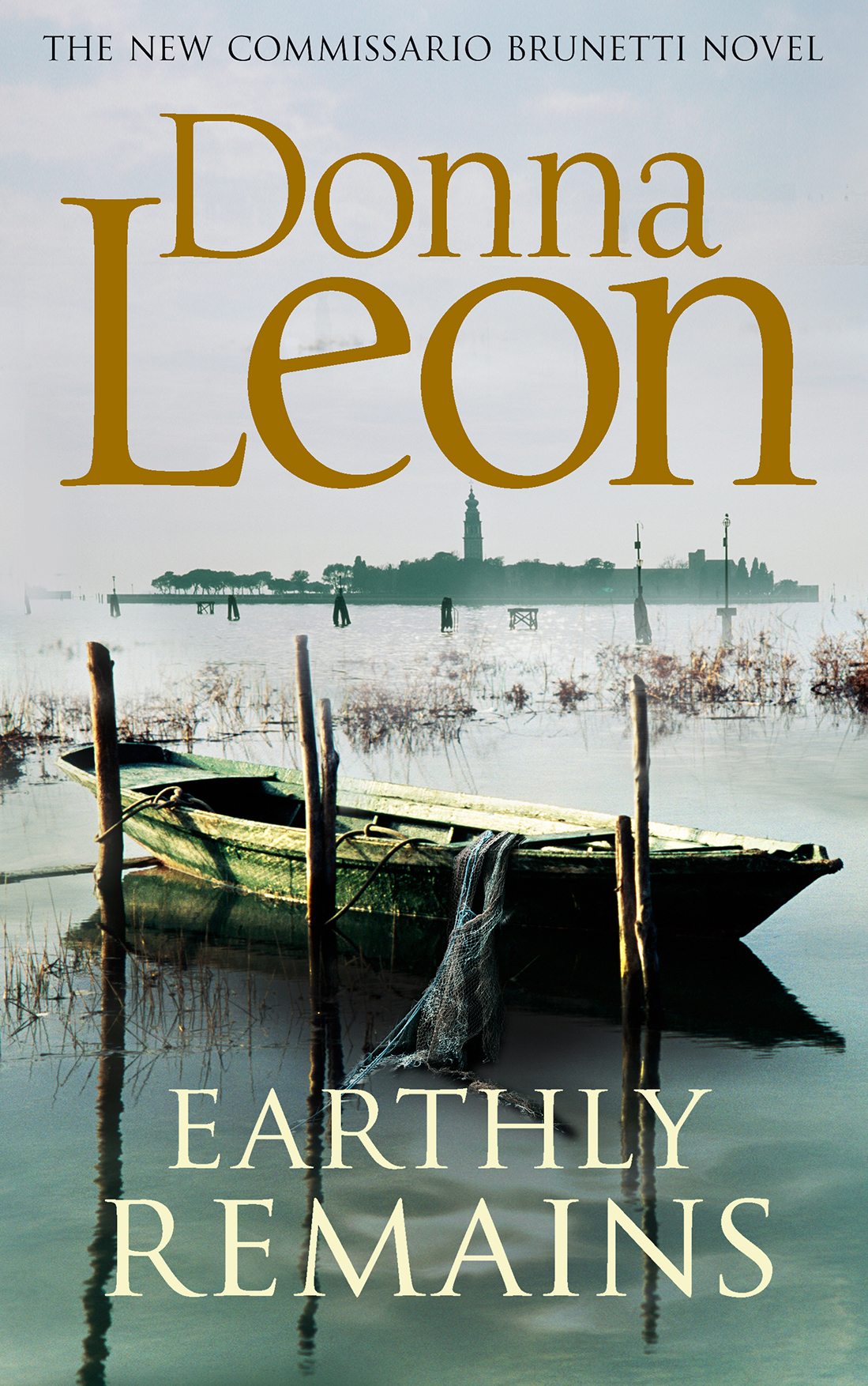 The 26th Brunetti mystery sees nothing of Brunetti's children, and very little of Paola. Although there is of course food.
The 26th Brunetti mystery sees nothing of Brunetti's children, and very little of Paola. Although there is of course food.
It seems like the corruption in Venice has finally gotten to Brunetti. In order to save Pucetti from himself, Guido pretends to fall ill, and then is unable to stop the chain of events that puts him into the hospital.
'I can't stand it any longer, doing what I do,' Brunetti surprised himself by saying. 'I had to fake all this and end up here in the hospital, with doctors prodding and poking at me, just because I have to protect the people I work with from reacting to the work they do.'
So Brunetti takes his doctors advice–and the advice and prodding of Paola–and gets out of the city for awhile. He ends up spending his days on the laguna, with the man who keeps the house where Brunetti is staying, and the physicality of it is good for his spirit and soul.
Seeing the perfect balance of his motion, back and forth, back and forth, hands effortlessly in control of the oar, Brunetti thought that no man his own age or younger would be able to row like this because he would spoil it by showing off. The drops from the blade hit the water almost invisibly before the oar dipped in and moved towards the back. His father had rowed like this.
If you're looking for the mystery to start from the get-go, this is not the book for you. This book is for long-time fans of Brunetti who wonder how he hasn't broken prior to this, and don't mind spending days on the laguna.
When Brunetti remarked on the generosity of the fishermen they met, Casati said fishermen were always generous, far more so than farmers. To Brunetti's question, he explained that fishermen knew their catch would last no more than a day, so it was easy for them to give it away: give it away or watch it rot. Farmers, however, could store what they reaped and so had a tendency to keep it or even hoard it.
Because of that, it's almost a shock when the death does come, even though you know someone is going to be murdered, because this is a murder mystery.
It's always the odd, unpredictable things that set us off, Brunetti thought. Grief lies inside us like a land mine: heavy footsteps will pass by it safely, while others, even those as light as air, will cause it to explode.
As I said, this book is more about Brunetti than about the murder that eventually comes, so I wouldn't recommend it to a first time reader searching for a police procedural, but it really is a good story. It also reminded me a great deal of Through a Glass, Darkly and Death in a Strange Country, with the look at pollution and corruption.
Published by Atlantic Monthly Press
April 2017 | Rating: 8/10
The Temptation of Forgiveness (2018) #27
 One of Paola's co-workers comes to Brunetti because she fears her son is using drugs. Elletra seems to have gotten herself into a spot of trouble. Patta wants Brunetti to deal with issues with Scarpa.
One of Paola's co-workers comes to Brunetti because she fears her son is using drugs. Elletra seems to have gotten herself into a spot of trouble. Patta wants Brunetti to deal with issues with Scarpa.
The instinct to institutional survival stilled Brunetti's tongue. He waved his hand and nodded in agreement, then said, 'Someone might have invented this rumour to create friction between the Lieutenant and his colleagues. There's no doubt that the Lieutenant has won a place in the opinion of his fellow workers.' Brunetti paused minimally and then added, while Patta was working out his precise meaning, 'I'd discount the reports, sir. That is, if you're asking my opinion.'
One of the things I like about Brunetti is that he is never cruel and tries to be kind.
'Why are you always so kind to him, Signore?' Signorina Elettra asked.
Brunetti had to consider this: he had never given conscious thought to how to respond to Alvise. 'Because he needs it,' he said.
As far as the story goes, the mystery was interesting, because although there was crime (and lots of it) we didn't have a murder. And everything was in that gray space where it's sometimes hard to tell what is really a sin and what isn't.
That said, this wasn't one of the strongest entries in the series, but it was enjoyable.
I'm kinda sorry that his kids have stopped aging–I suppose it's more useful to have kids in school, but seeing the kind of adults they'd become seems far more interesting.
Brunetti remembered once having a son who was a declared enemy of capitalism, who longed to see the entire wicked system destroyed. How could he, the boy's father – and a policeman, to boot – have failed to notice when the kidnappers from the European Central Bank came in and replaced his own son with a replicant?
So I enjoyed the story, but it wasn't one of the best. But that won't stop me from getting the next.
Publisher: Atlantic Monthly Press
March 2018 | Rating: 7/10
Unto Us a Son Is Given (2019) #28
 Brunetti's father-in-law is worried about a friend, and asks Guido to see if his concerns are justified.
Brunetti's father-in-law is worried about a friend, and asks Guido to see if his concerns are justified.
'Gonzalo's my best friend. We were at boarding school together.' He looked across at Brunetti and said, unable to restrain his surprise, 'My God, it was more than sixty years ago.'
The issue is inheritance in laws in Italy.
'As you know, the law decides where most of his estate will go, regardless of his wishes.' Before Brunetti could summon to mind the relevant law, il Conte went on. 'It stays in the family, goes to his siblings, no matter how he might feel about them, no matter what sort of Philistines they might be.' So neutral was il Conte's tone that he might as well have been reading the recipe for plum cake. Then, in the same calm tone, he remarked, 'I suspect it's a law made for the convenience of the rich.'
The problem is that it's more confusing than just the inheritance laws.
Brunetti thought about how taking a look at one's unconscious motives and prejudices was like walking barefoot in cloudy water: you never knew whether you were going to step on something disgusting or bang your toe into a rock.
I'll be honest, it took me a bit to really understand they whys of the murder that happens. We get a lot of excerpts from letters and emails, but they never really made sense to me in the context of why they make Brunetti so unhappy.
The murder itself made sense, after the inheritance laws were repeated several times, but I didn't see the motive Brunetti did in the exchanges.
But still, I do love Brunetti.
Brunetti started to get up, and his copy of The Trojan Women fell from the sofa to the floor. He bent and picked it up, saying, 'I finished it.' Then, almost sulking, 'Now I don't have anything to read.'
Paola smiled up at him. 'You've got three long shelves in my study, Guido. Surely there's something to read there.'
He nodded. 'I know. It's really that I don't know what I want to read.'
This was a so-so Brunetti mystery. It checked off all the boxes: Vianello, Elettra, Paola, food, Italian politics and law. But it didn't have the same pull other books in the series did.
I enjoyed it, but not as much as previous stories.
Publisher: Atlantic Monthly Press
March 2019 | Rating: 7/10
Trace Elements (2020) #29
 Book 29 of the Commissario Guido Brunetti series.
Book 29 of the Commissario Guido Brunetti series.
Brunetti and Griffoni go to a hospice because a dying woman wants to talk to them. Her husband recently was killed in a car accident, and she seems to be telling them that he was killed.
Brunetti finally accepted the appalling thought: a dying woman put out on the street because she couldn't pay for the hospital. Where were they, for God's sake, America?
Meanwhile, Patta wants two Rom girls who are regularly picked up for pick-pocketing taken off the streets–at least for a few days while a magazine article is lauding Venice.
'If this goes public, it will cause me nothing but trouble, Brunetti. I'm in the middle of buying an apartment, and if this gets out of hand, the mayor might force them to transfer me somewhere else. It has to be contained.'
Though with the terrible heat wave, it doesn't seem like anyone would want to actually be in Venice.
As usual, I enjoyed the mystery here–even if it ends (as it usually does) ambiguously.
And I do love the little cultural bits that are so strange to me and yet so lovely.
(T)o Griffoni, whom she obviously had not seen since Signora Toso's death, she added, 'I'm terribly sorry about what happened.'
Griffoni nodded her thanks but failed to speak. Instead, she raised a hand and threw open her palm, as if to release the dead woman's spirit into the air.
The three of them remained silent for enough time to allow that spirit to escape the room.
As most of the recent Burnetti books have been, there is a pretty heavy environmental aspect to the story–both with the heat wave and with the work of the man who was killed in a traffic accident. I agree with everything she is getting at, but I still think some of it is a bit heavy handed.
There was one strange bit, in that Scarpa comes up, but then that plot line is completely dropped. It comes out of nowhere and goes nowhere, so I'm not sure why it was even mentioned.
But, it was still a lovely escape to Venice.
Publisher: Atlantic Monthly Press
March 2020| Rating: 7.5/10
Transient Desires (2021) #30
 Two young American women were left on the dock outside the hospital–one with serious injuries.
Two young American women were left on the dock outside the hospital–one with serious injuries.
What happened? Why were they abandoned? These and other questions lead Brunetti and his fellow officer Griffoni to find out what happened to the women–and more importantly, why.
This is another of the darker stories. Although there is no murder for Brunetti to investigate, don't think that means there isn't death and bad things happening.
There are also plenty of reminds of just how different policing and justice can be in Italy.
'I've asked the men and the one other woman in the unit to make a note of gossip and hearsay and things that get said in the bars. It's all to be written in pencil and given to me. I copy it and destroy the original pieces of paper, so everything is clearly in my handwriting, should it ever become a problem.'
'There must be more crime in Rome,' Brunetti ventured.
'Well,' she said and gave a long, obviously thoughtful, pause, 'the government and the Vatican are there.'
Going back to the very first mystery, there is an LGBT plot point, only this time instead she doesn't soft-pedal it with women.
'No, I wouldn't mind. Yet,' he began and saw (the young man) grow suddenly more alert. 'Yet I'd worry that it might complicate his life or make it difficult.' He gave himself time to follow this idea, then finished by saying, 'But not as difficult and painful as it would be if he pretended to be heterosexual and wasted his life with that.'
As often happens with these books, the ending is uncertain, and it bothers me more than normal, though I can't explain why without giving away the much of the mystery. Suffice to say I would have preferred an epilogue to this story. I'm also not sure why that ending happened, what with so many people around who should have been able to stop it.
Publisher: Atlantic Monthly Press
August 2021 | Rating: 8/10
Give Unto Others (2022) #31
 This
is the 31st Brunetti book. It seems weird this series has been running
for 30 years. Partially because at some point she stopped aging Brunetti
and his family, so his eldest has been on the cusp of adulthood for
more than a decade.
This
is the 31st Brunetti book. It seems weird this series has been running
for 30 years. Partially because at some point she stopped aging Brunetti
and his family, so his eldest has been on the cusp of adulthood for
more than a decade.
This book is set during the pandemic, with all the characters at the Questura moving forward in time while themselves remaining unchanging.
This isn't a ding on the series. Some of my favorite mystery authors do this, wanting to keep writing a character, and unlike Ian Rankin, not wanting to force their characters into retirement. Once you realize what's happening, you just accept it, but there are always a couple books where the characters pasts start to shift before fading entirely.
I find it fascinating.
As far as the pandemic, Brunetti has several ruminations on the events–many of which revolve around the emptiness of Venice.
it resembled attending an autopsy, or, more accurately, walking into the morgue at the Ospedale. In Campo Manin, the bodies of dead shops lined the way to the canal. There was a dead Middle Eastern fast-food place, a dead sporting goods shop, a dead clothes shop with two dead mannequins in the window, and, at last, the dead travel agency. Luckily, shops didn't have toes.
The mystery was ok. Honestly, right now the draw of the books is spending with in Venice with these characters. The mysteries are mostly secondary.
Publisher: Atlantic Monthly Press
August 2022 | Rating: 7/10
So Shall You Reap (2023) #32
 This is the 32nd book in the Commissario Brunetti series.
This is the 32nd book in the Commissario Brunetti series.
Like so many other characters in mysteries, Brunetti and his family have stopped aging, Chiara forever trapped as a young teen.
Like the previous couple books, the mysteries are ok. The draw of this story remains Brunetti and Venice.
Brunetti followed him and, as he had the first time he was there, stood and gawked at the multistorey building and again tried to count the floors. As ever, he failed, defeated by the architect, who had granted more than one horizontal window to each floor.
Living in a city where everyone walks must be lovely, and strange.
Brunetti could not remember ever having passed him on the street.
My favorite character in this story is the nun Brunetti meets in the course of his investigations.
'She misses him,' Suor Benedetta said. 'Now that he's gone, she's always going over the wall, trying to find him.' She put out her hand, and Sara came back and took a lick at it. 'We miss him too,' she added.
'Because he helped you?'
The nun's face tightened with confusion. 'No. Because he was good.'
It's passages like that that keep me reading the series, those human interactions that make you feel like you're watching a friend rather than investigating a murder.
Publisher: Atlantic Monthly Press
December 2023 | Rating: 7/10
